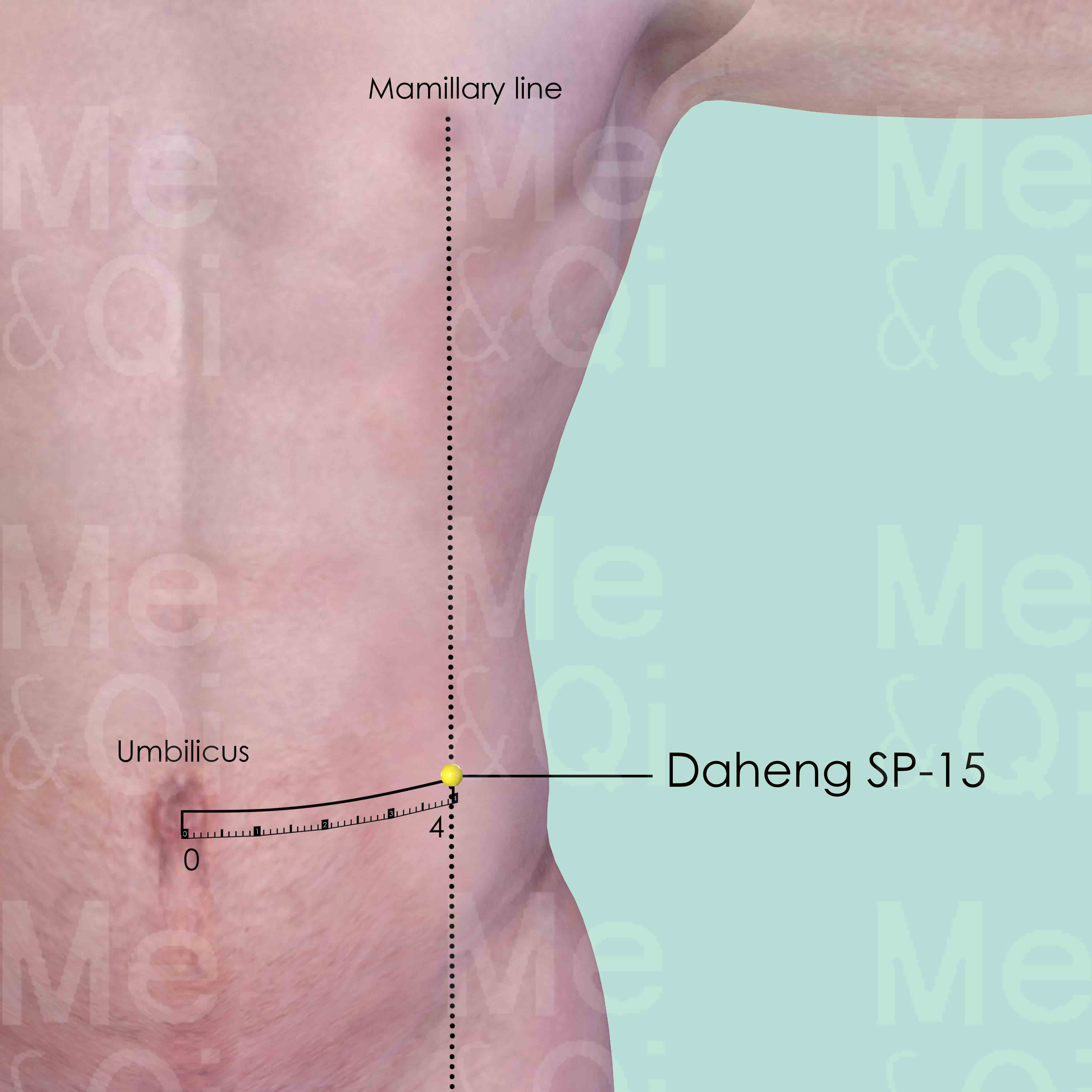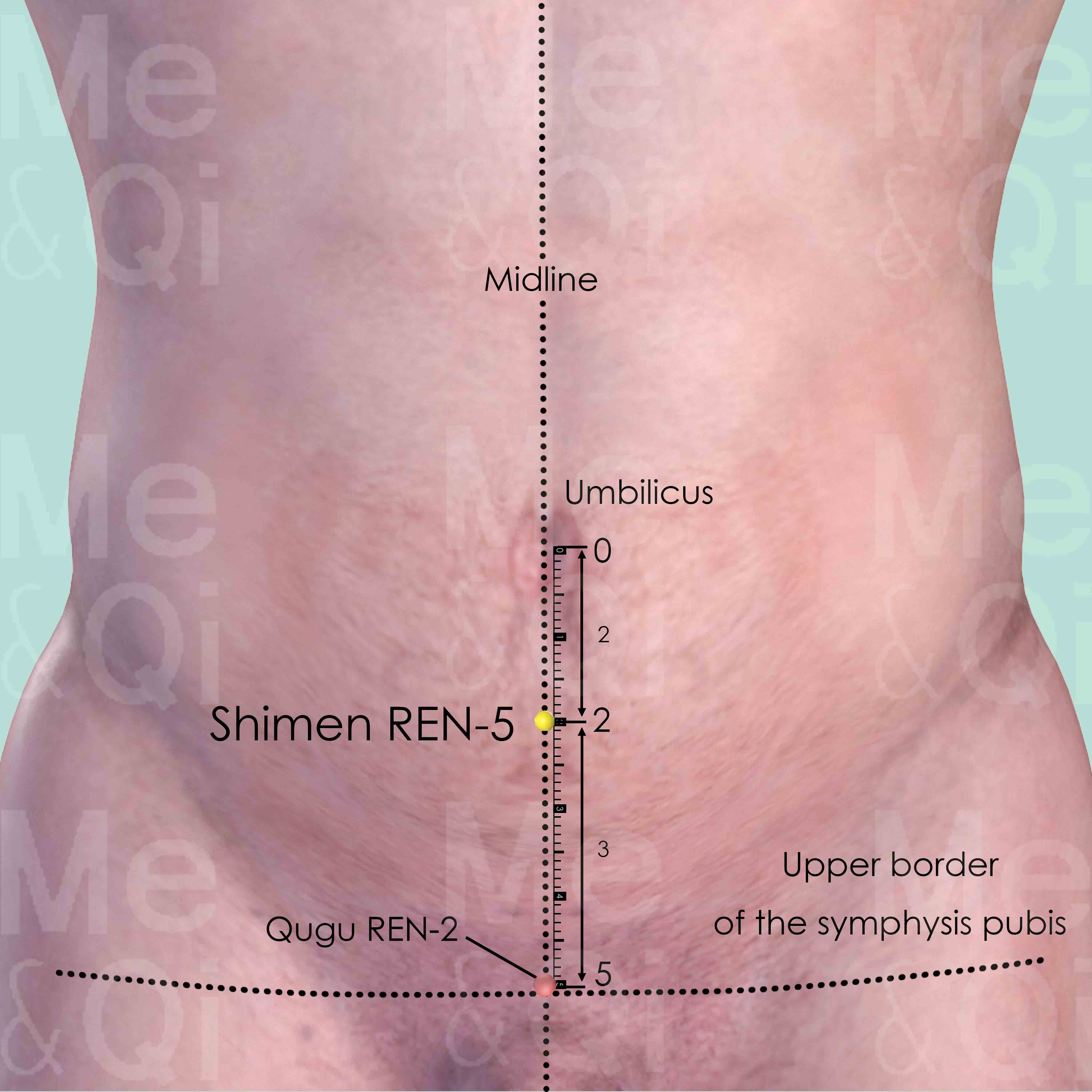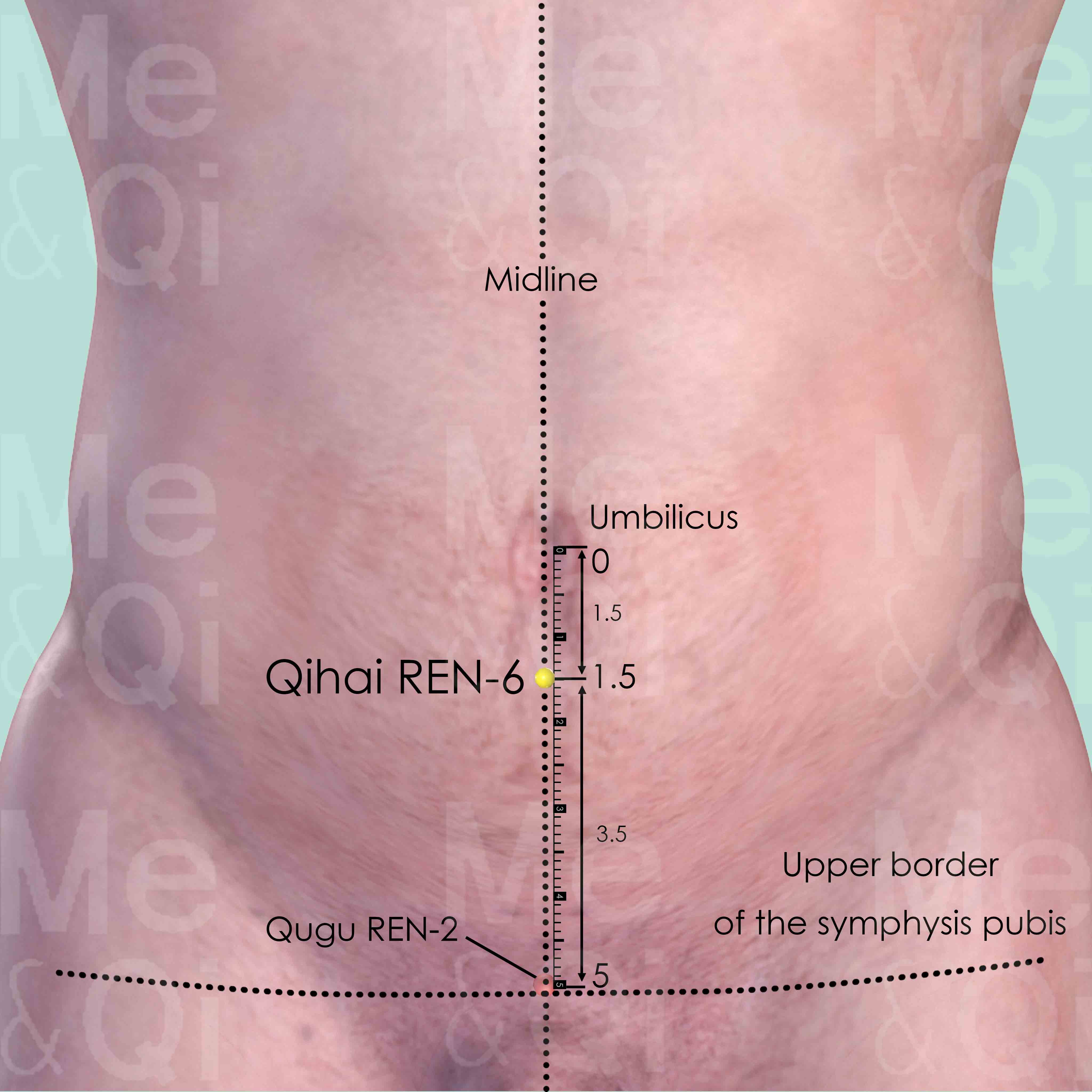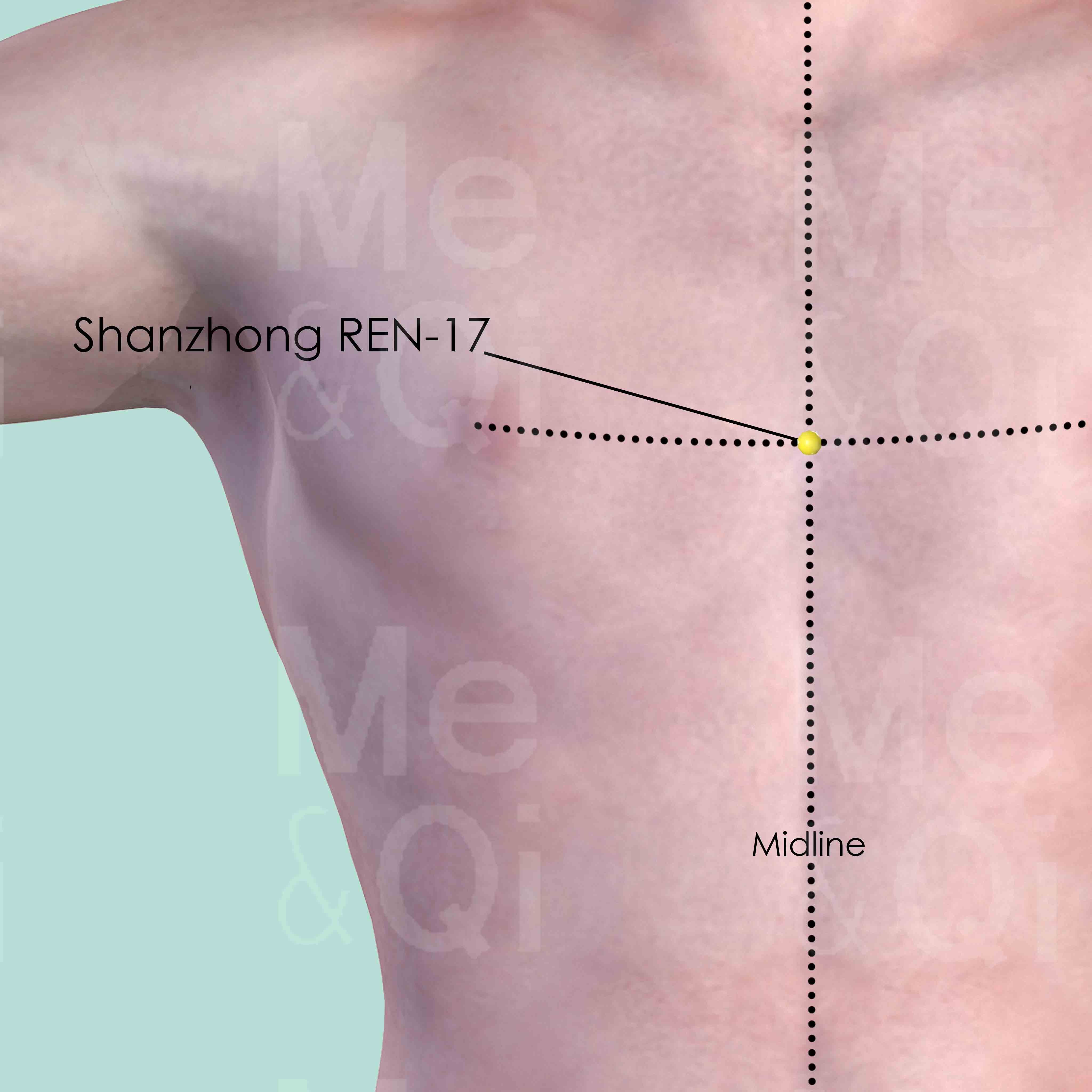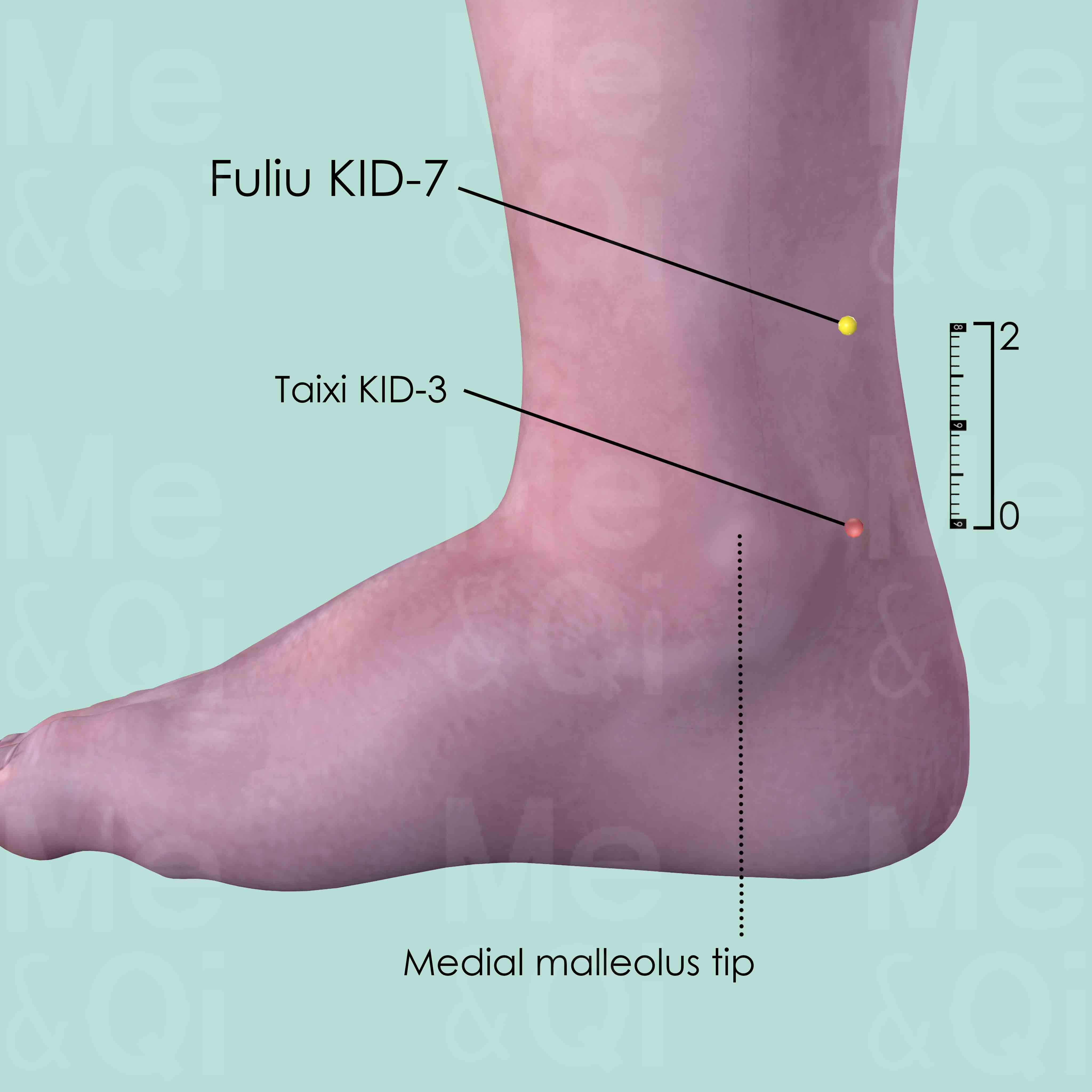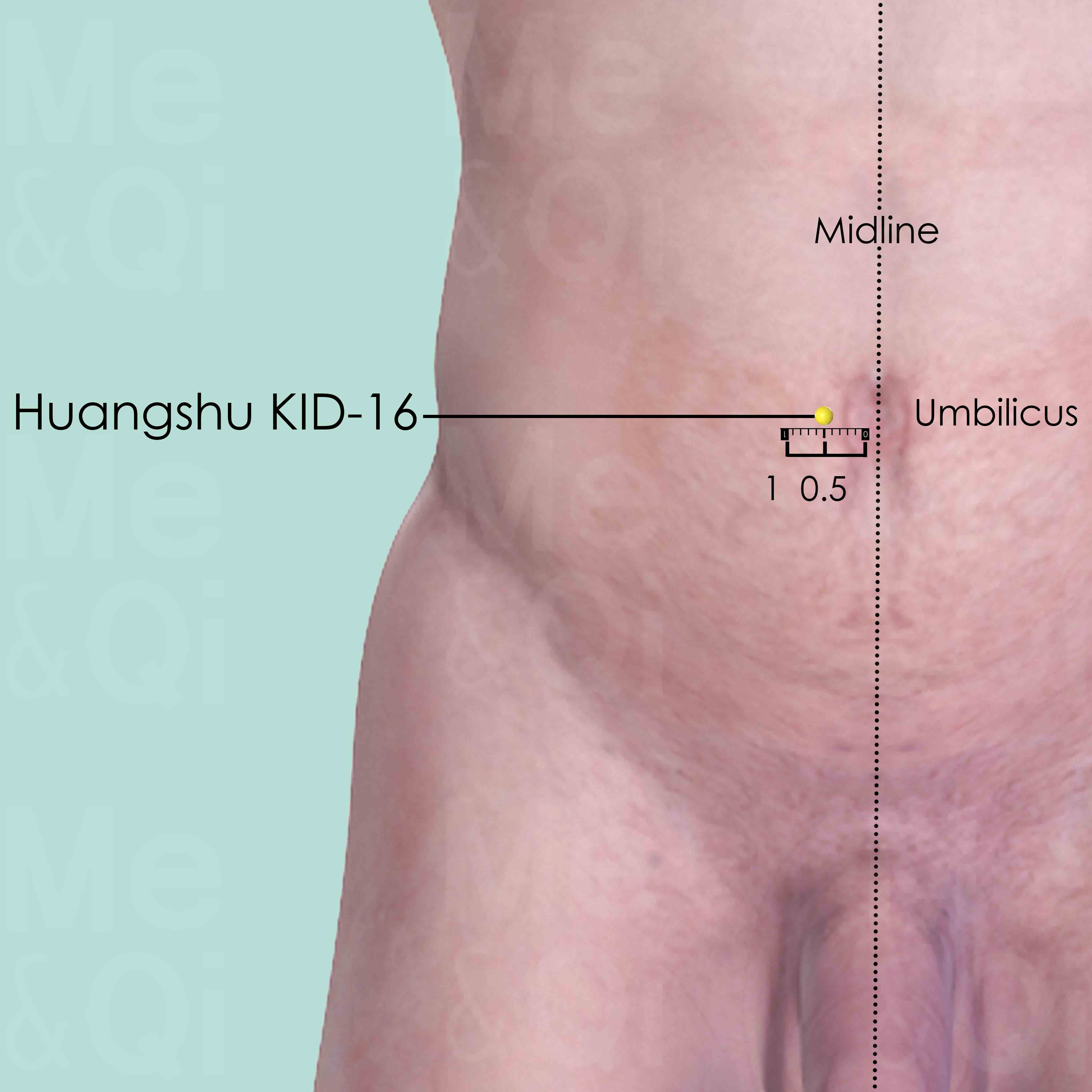Generalized Fatigueaccording to TCM
Symptom family: Fatigue and Sleepiness
Sub-symptom(s): Exhaustion Morning Fatigue Chronic Fatigue Syndrome Exhaustion From Long Term Illness
Did you mean? General Weakness
What is Generalized Fatigue?
Generalized fatigue is a common complaint characterized by a pervasive and persistent sense of weariness, lack of energy, and diminished capacity for physical and mental work. Unlike normal tiredness which results from specific exertion and is usually alleviated by rest, generalized fatigue is chronic and not proportionate to one's activity level.
This symptom can manifest in various forms, such as debility, lassitude, and exhaustion, including specific types like morning fatigue and chronic fatigue syndrome.
How does TCM view Generalized Fatigue?
In Traditional Chinese Medicine (TCM), generalized fatigue is viewed through the lens of energy balance and harmony within the body. TCM practitioners believe this condition results from disharmonies or deficiencies in the body’s Qi (vital energy), Blood, Yin, or Yang.
TCM approaches fatigue not just as a physical issue but as a holistic imbalance, emphasizing the interconnectedness of physical symptoms with emotional and mental well-being. Identifying the underlying pattern of disharmony is crucial for effective treatment in TCM.
Root Causes of Generalized Fatigue in TCM
TCM attributes generalized fatigue to various imbalances. Qi Deficiency is a common cause, where the body lacks the vital energy to perform its functions, leading to symptoms like tiredness and lethargy.
Blood Deficiency, another cause, leads to inadequate nourishment of the body, resulting in fatigue and weakness. These deficiencies often arise from an imbalance in organ systems such as the Spleen or Kidney, affecting the body's ability to generate Qi and Blood. In TCM, understanding the specific underlying pattern is key to addressing generalized fatigue effectively.
Explore below more details about what might cause Generalized fatigue according to TCM.
- By Syndrome
- By Organ
- Qi Deficiency
- Yang Deficiency
- Yin Deficiency
- Blood Deficiency
- Dampness
- Cold
- Phlegm
- Heat
- Qi Sinking
- Essence Deficiency
- Blood Stasis
- Qi Rebellion
- Yang Excess
- Summer Heat
- Wind
- View More Causes
- Spleen
- Heart
- Kidney
- Liver
- Stomach
- Lung
- Uterus
- Large Intestine
- Pericardium
- View More Organs
Qi Deficiency
Qi Deficiency in TCM is like running low on battery power. Qi is the vital energy that powers every function in your body. When there's a Qi Deficiency, it means your body doesn't have enough of this essential energy. This can make you feel tired all the time, weak, or even cause shortness of breath. It's similar to how you feel when you haven't had enough sleep or nutritious food. Your body just doesn't have the energy it needs to perform at its best. Unlike modern medicine, which often focuses on specific physical causes for fatigue and weakness, TCM views Qi Deficiency as an overall energy depletion that affects your entire well-being, and it seeks to replenish and balance this vital energy.... see more
Qi Deficiency Patterns That Can Lead to Generalized Fatigue
Common Symptoms: Lack Of Appetite Diarrhea Pale Face Shortness Of Breath Palpitations General Weakness Weak Voice Spontaneous Sweat
| Pattern Name | Relevant Symptoms | Relevant Formulas |
|---|---|---|
| Qi Deficiency | Fatigue, Tiredness, General weakness, Weak voice, Generalized fatigue, Low energy, Reluctance to speak, Spontaneous sweat, Frequent colds or flu, Lack of appetite, Diarrhea, Shortness of breath... see more | Bu Zhong Yi Qi Tang | Gui Pi Tang | Gu Ben Zhi Beng Tang | Si Jun Zi Tang | Liu Jun Zi Tang | Ju Yuan Jian |
| Qi and Blood Deficiency | Fatigue, Tiredness, General weakness, Generalized fatigue, Weak voice, Pale face, Shortness of breath, Palpitations, Dizziness, Poor memory, Insomnia, Reluctance to speak, Lack of appetite, Limb numbness, Skin numbness... see more | Ren Shen Yang Rong Tang | Bu Zhong Yi Qi Tang | Gui Pi Tang | Shi Quan Da Bu Tang | Si Wu Tang | Tong Ru Dan | Ba Zhen Yi Mu Tang | Sheng Yu Tang | Ba Zhen Tang | Guo Qi Yin | Zhi Gan Cao Tang |
| Heart Qi Deficiency | Fatigue, Palpitations, Exertional dyspnea, Pale face, Spontaneous sweat, Generalized fatigue... see more | Bao Yuan Tang | Bai Zi Yang Xin Wan | Bai Zi Yang Xin Tang |
| Kidney Qi not Firm | Fatigue, Lower back pain, Lower back weakness, Polyuria, Weak urine stream, Enuresis, Nocturnal emission, Generalized fatigue, Chills, Cold extremities, White vaginal discharge, Bearing down sensation in abdomen, Recurrent miscarriage... see more | You Gui Wan | Jin Suo Gu Jing Wan | Fu Tu Dan | Qing E Wan | Tu Si Zi Wan |
| Liver Qi Deficiency | Fatigue, Dizziness, Blurry vision, Eye floaters, Nervousness, Timidity, Easily startled, Lack of bravery, Indecision, Sighing, Vivid dreaming, Depression, Irritability, Hypochondriac distention, Irregular periods, Lack of appetite, Generalized fatigue, Abdominal distention... see more | Bu Zhong Yi Qi Tang | Si Wu Tang | Xiao Yao San |
| Spleen Qi Deficiency | Fatigue, Lassitude, Slight abdominal distension after eating, General weakness, Desire to lie down, Slight abdominal pain, Excessive gas and flatulence, Bloated abdomen, Dyspepsia, Swollen complexion, Obesity... see more | Si Jun Zi Tang | Liu Jun Zi Tang | Fei Er Wan |
| Spleen and Lung Qi Deficiency | Tiredness, Lassitude, Lack of appetite, Slight abdominal distension after eating, Generalized fatigue, General weakness, Pale face, Weak limbs, Diarrhea, Obesity, Shortness of breath, Coughing, Weak voice, Spontaneous sweat, Reluctance to speak, Frequent colds or flu, Aversion to cold... see more | Si Jun Zi Tang | Liu Jun Zi Tang |
| Stomach and Spleen Qi Deficiency | Tiredness, Lassitude, Lack of appetite, Slight abdominal distension after eating, Generalized fatigue, General weakness, Pale face, Weak limbs, Diarrhea, Upper abdominal discomfort, Loss of taste... see more | Si Jun Zi Tang | Shen Ling Bai Zhu San | Sheng Yang Yi Wei Tang | Xiang Sha Yang Wei Wan |
| Lung and Heart Qi Deficiency | Tiredness, Shortness of breath, Coughing, Weak voice, Reluctance to speak, Pale face, Frequent colds or flu, Generalized fatigue, Palpitations, Depression, Spontaneous sweat, Sighing... see more | Bao Yuan Tang | Si Jun Zi Tang |
| Lung Qi Deficiency | Tiredness, Diurnal hyperhidrosis, Reluctance to speak | Si Jun Zi Tang | Zhi Gan Cao Tang | Jiu Xian San | Bu Fei Tang | Ren Shen Ge Jie San |
| Stomach Qi Deficiency | Tiredness in the morning, Morning fatigue | Si Jun Zi Tang |
| Heart and Spleen Qi and Blood Deficiency | Fatigue, Palpitations, Poor memory, Restless sleeplessness, Fever, Lack of appetite, Generalized fatigue, Coughing, Shortness of breath, Exertional dyspnea, Weight loss... see more | Ren Shen Yang Rong Tang |
| Spleen or Kidney Qi Deficiency | Fatigue, Early menstruation, Pale menstrual flow, Lower back pain, Dizziness, Chills, Nocturia, Thin menstrual blood, Shortness of breath, Palpitations, Spontaneous sweat... see more | Bu Zhong Yi Qi Tang | Gui Pi Tang | He Che Da Zao Wan |
| Heart and Spleen Deficiency | Fatigue, Palpitations, Insomnia, Lack of appetite, Generalized fatigue, Anxiety, Pale face, Poor memory, Diarrhea, Scanty menstruation, Pale lips... see more | Gui Pi Tang |
| Spleen and Stomach Qi Deficiency | Fatigue, Dizziness, Unsteadiness, Blurry vision, Deafness, Tinnitus, Shortness of breath, Weak voice, Pale face, Lack of appetite, Diarrhea... see more | Ren Shen Yang Rong Tang | Ba Zhen Tang |
| Spleen Deficiency | Tiredness, Sticky vaginal discharge, Generalized fatigue, Depression, Cold extremities, Diarrhea, White vaginal discharge, Lack of appetite, Amenorrhea, Dull shallow face, Weak limbs... see more | Bu Zhong Yi Qi Tang | Wan Dai Tang | Yi Huang Tang |
| Stomach Deficiency | Tiredness, Nausea or vomiting, Generalized fatigue, Chills, Lack of appetite, Depression, Dry mouth, Morning sickness... see more | Xiang Sha Liu Jun Zi Tang | Er Chen Tang | Mai Men Dong Tang |
| Spleen Deficiency with Dampness | Tiredness, Edema, Feeling of heaviness, Diarrhea, Urinary dysfunction, Glomerulonephritis, Kidney infection, Nephrotic syndrome, Cystitis, Hydrocele, Migraine... see more | Liu Jun Zi Tang | Bi Xie Fen Qing Yin |
Yang Deficiency
Yang deficiency in TCM refers to a state where the body's Yang energy, which is responsible for warmth, activity, and function, is weakened or diminished. This pattern of disharmony often arises from chronic illness, aging, or inherent constitutional weakness. Symptoms of Yang deficiency are typically associated with cold and sluggishness, such as a feeling of coldness, cold extremities, pale complexion, low energy or fatigue, and a desire for warmth. Digestive issues like poor appetite, loose stools, and water retention can also be indicative of Yang deficiency.... see more
Yang Deficiency Patterns That Can Lead to Generalized Fatigue
Common Symptoms: Chills Cold Extremities Diarrhea Lack Of Appetite General Weakness Frequent Urination Pale Face Hypertension
| Pattern Name | Relevant Symptoms | Relevant Formulas |
|---|---|---|
| Heart Yang Deficiency | Fatigue, Palpitations, Exertional dyspnea, Generalized fatigue, Spontaneous sweat, Slight feeling of stuffiness in the heart, Chills, Cold hands, Bright pale face, Dark lips... see more | Gui Zhi Jia Long Gu Mu Li Tang |
| Kidney Yang Deficiency | Fatigue, Lassitude, Tiredness, Exhaustion from long-term illness, Lower back pain, Dizziness, Tinnitus, Weak and cold knees, Lower back coldness, Chills, Weak legs, Bright pale face, Generalized fatigue, General weakness, Leg edema, Female infertility, Diarrhea, Depression, Erectile dysfunction, Premature ejaculation, Oligospermia, Low sex drive, Pale and abudant urination, Constipation... see more | Shen Qi Wan | Er Xian Tang | You Gui Wan | Tu Si Zi Wan | Ba Wei Di Huang Wan | Wu Zi Yan Zong Wan | Ji Chuan Jian |
| Lung Yang Deficiency | Fatigue, Coughing and wheezing with copious sputum, Cold extremities, Spontaneous sweat, Frequent colds or flu, Pale face, Generalized fatigue, Shortness of breath, Absence of thirst, Wheezing, Weak voice... see more | Gan Cao Gan Jiang Tang | Si Jun Zi Tang | Sheng Mai San |
| Spleen Yang Deficiency | Fatigue, Lassitude, Slight abdominal distension after eating, General weakness, Desire to lie in fetal position, Pale face, Cold extremities, Chills, Undigested food in stools, Excessive gas and flatulence, Bloated abdomen, Abdominal pain relieved by pressure and warmth, Dull shallow face... see more | Bu Zhong Yi Qi Tang | Zhen Wu Tang | Yi Huang Tang | Huang Tu Tang | Wen Pi Tang |
| Yang Deficiency or Empty Yang | Fatigue, Lassitude, Chills, General cold feeling, Pale urine, Undigested food in stools, General weakness, Abdominal pain relieved by pressure and warmth, Frequent urination, Polyuria, Nocturia, White vaginal discharge... see more | You Gui Wan | Ba Wei Di Huang Wan | Ban Liu Wan |
| Kidney and Spleen Yang Deficiency | Tiredness, Lassitude, Lower back pain, Weak and cold knees, Back cold sensation, Chills, Weak legs, Bright pale face, Erectile dysfunction, Premature ejaculation, Oligospermia, Watery ejaculate, Low sex drive, Generalized fatigue, General weakness, Clear urination, Nocturia, Apathy, Leg edema, Female infertility, Diarrhea, Depression, Lack of appetite, Slight abdominal distention, Desire to lie down... see more | Li Zhong Wan |
| Greater Yin stage | Tiredness, Lack of appetite, Vomit, Abdominal fullness, Chills, Diarrhea, Absence of thirst, Generalized fatigue... see more | Li Zhong Wan |
| Stomach Yang Deficient and Cold | Tiredness, Epigastric pain relieved with pressure or eating, Lack of appetite, Desire for hot beverages and foods, Vomiting clear liquid, Absence of thirst, Weak limbs, Cold extremities, Generalized fatigue, Pale face... see more | Xiang Sha Yang Wei Wan | Xiao Jian Zhong Tang | Huang Qi Jian Zhong Tang | Wu Zhu Yu Tang |
| Wind-Cold invading with Yang Deficiency | Exhaustion, Low grade fever, Severe chills, Hypersomnia, Cold extremities, Lumbar pain, Lower back pain, Lower back coldness, General cold feeling, Lack of sweating, Headaches, Weak voice... see more | Ma Huang Xi Xin Fu Zi Tang | Zai Zao San |
| Deficiency of both the Kidney Yin and Yang | Fatigue, Lassitude, Menopausal symptoms, Hypertension, Irregular periods, Menopausal hot flashes, Perspiration, Irritability, Generalized fatigue, General weakness, Depression, Palpitations... see more | Er Xian Tang |
| Spleen or Kidney Yang Deficiency | Tiredness, Abdominal pain that worsens with cold, Urinary dysfunction, Deep pain and heaviness in limbs, Dizziness, Heavy sensation in the head, Edema, Diarrhea, Palpitations, Coughing, Vomit... see more | Gu Ben Zhi Beng Tang |
Yin Deficiency
Yin deficiency in TCM is a pattern of disharmony characterized by a depletion of the body's Yin energy, which represents the cooling, moistening, and nurturing aspects of our physiology. This condition often arises from factors like chronic stress, overwork, insufficient rest, or prolonged illness. Symptoms of Yin deficiency can include a sensation of heat, especially in the afternoon or evening, night sweats, insomnia, a dry mouth or throat, and a red tongue with little coating. There might also be a general feeling of restlessness or irritability. Since Yin is essential for balancing the body's active and warm Yang energy, its deficiency leads to a relative excess of Yang, manifesting as heat or dryness symptoms.... see more
Yin Deficiency Patterns That Can Lead to Generalized Fatigue
Common Symptoms: Night Sweats Dry Mouth Insomnia Hot Palms And Soles Dizziness Tinnitus Dry Throat Dry Stools
| Pattern Name | Relevant Symptoms | Relevant Formulas |
|---|---|---|
| Kidney and Liver Yin Deficiency | Fatigue, Dizziness, Tinnitus, Hearing loss, Lower back pain, Vertical headaches, Occipital headache, Insomnia, Limb numbness, Tingling of limbs, Dry eyes, Blurry vision, Dry throat, Dry hair, Skin dryness, Withered and brittle nails, Vaginal dryness, Night sweats, Dry stools, Nocturnal emission, Scanty menstruation, Amenorrhea, Late menstruation, Infertility... see more | He Che Da Zao Wan | Tiao Gan Tang | Gui Shao Di Huang Tang | Zuo Gui Yin | Si Wu Tang |
| Empty-Heat or Fire caused by Yin Deficiency | Fatigue, Afternoon heat sensation, Dry mouth, Preference for sipping, Dry mouth and throat at night, Night sweats, Cardiac burning sensation, Hot palms and soles, Dry stools, Scanty and dark urine, Flushed cheekbones... see more | Qing Hao Bie Jia Tang | Huang Lian E Jiao Tang | Dang Gui Liu Huang Tang | Tian Wang Bu Xin Dan | Suan Zao Ren Tang |
| Stomach and Spleen Yin Deficiency | Fatigue, Lack of appetite, Dry mouth, Preference for sipping, Dry stools, Dry lips, Nausea, Generalized fatigue, Upper abdominal discomfort, Loss of taste... see more | Shen Ling Bai Zhu San |
| Kidney Yin Deficiency | Tiredness, Lassitude, Perspiration, Back pain, Hearing loss, Dry mouth and throat at night, Lower back pain, Constipation, Scanty and dark urine, Infertility, Premature ejaculation, Generalized fatigue, General weakness, Depression, Anxiety, Heat sensation in palms, Evening heat sensation, Flushed cheekbones, Menopausal hot flashes, Preference for sipping, Evening anxiety... see more | Liu Wei Di Huang Wan | Bai Zi Yang Xin Tang | Zuo Gui Wan | Zhi Bo Di Huang Wan | Qi Bao Mei Ran Dan |
| Lung Yin Deficiency | Tiredness, Hoarse voice, Itchy throat, Reluctance to speak, Thin chest | Jiu Xian San | Yang Yin Qing Fei Tang | Qing Zao Jiu Fei Tang | Bu Fei E Jiao Tang |
| Heart Yin Deficiency | Exhaustion, Night sweats, Feeling of uneasiness, Feeling hot, Heat sensation in palms | Tian Wang Bu Xin Dan | Ren Shen Dang Gui Tang |
| Deficiency of both the Kidney Yin and Yang | Fatigue, Lassitude, Menopausal symptoms, Hypertension, Irregular periods, Menopausal hot flashes, Perspiration, Irritability, Generalized fatigue, General weakness, Depression, Palpitations... see more | Er Xian Tang |
| Empty-Heat caused by Yin Deficiency | Fatigue, Nighttime fever, Emaciation, Chronic pyelonephritis, Pulmonary tuberculosis, Renal tuberculosis, Tidal fever, Hot palms and soles, Red skin eruptions, Night sweats, Generalized fatigue... see more | Qing Hao Bie Jia Tang |
| Yin and Blood Deficiency | Fatigue, Irritability, Heart palpitations with anxiety, Generalized fatigue, Restless sleeplessness, Poor concentration, Nocturnal emission, Poor memory, Dry stools, Mouth ulcers, Menopausal symptoms... see more | Tian Wang Bu Xin Dan |
| Stomach Deficiency | Tiredness, Nausea or vomiting, Generalized fatigue, Chills, Lack of appetite, Depression, Dry mouth, Morning sickness... see more | Xiang Sha Liu Jun Zi Tang | Er Chen Tang | Mai Men Dong Tang |
Blood Deficiency
Blood Deficiency in TCM is like when your body's tank runs low on the vital energy that blood provides. It's not exactly the same as anemia in modern medicine, which is about having too few red blood cells. Instead, Blood Deficiency in TCM is about your body not having enough of the life-giving qualities that blood brings, like nourishment and moisture. This can make you feel tired, look pale, and even feel dizzy or have blurry vision. It's like a garden not getting enough water to stay lush and vibrant. TCM sees this as an imbalance where the body isn't being nourished as it should be, impacting overall health and well-being.... see more
Blood Deficiency Patterns That Can Lead to Generalized Fatigue
Common Symptoms: Poor Memory Palpitations Lack Of Appetite Dizziness Insomnia Mental Exhaustion Depression Pale Face
| Pattern Name | Relevant Symptoms | Relevant Formulas |
|---|---|---|
| Qi and Blood Deficiency | Fatigue, Tiredness, General weakness, Generalized fatigue, Weak voice, Pale face, Shortness of breath, Palpitations, Dizziness, Poor memory, Insomnia, Reluctance to speak, Lack of appetite, Limb numbness, Skin numbness... see more | Ren Shen Yang Rong Tang | Bu Zhong Yi Qi Tang | Gui Pi Tang | Shi Quan Da Bu Tang | Si Wu Tang | Tong Ru Dan | Ba Zhen Yi Mu Tang | Sheng Yu Tang | Ba Zhen Tang | Guo Qi Yin | Zhi Gan Cao Tang |
| Heart Blood Deficiency | Fatigue, Easily startled, Vivid dreaming | Gui Pi Tang |
| Spleen Blood Deficiency | Fatigue, Lassitude, Lack of appetite, Generalized fatigue, General weakness, Pale face, Weak limbs, Diarrhea, Depression, Emaciation, Scanty menstruation, Amenorrhea, Insomnia, Slight abdominal distension after eating... see more | Gui Pi Tang |
| Spleen and Heart Blood Deficiency | Tiredness, Palpitations, Dizziness, Insomnia, Vivid dreaming, Poor memory, Anxiety, Easily startled, Dull pale complexion, Pale lips, Generalized fatigue, Muscle weakness, Diarrhea, Lack of appetite, Scanty menstruation... see more | Gui Pi Tang |
| Heart and Spleen Qi and Blood Deficiency | Fatigue, Palpitations, Poor memory, Restless sleeplessness, Fever, Lack of appetite, Generalized fatigue, Coughing, Shortness of breath, Exertional dyspnea, Weight loss... see more | Ren Shen Yang Rong Tang |
| Liver Blood and Kidney Essence Deficiency | Fatigue, Primary amenorrhea, Lower back pain, Generalized fatigue, Knee pain, Dizziness, Depression, Amenorrhea, Low energy, Chills, Dark face... see more | Dang Gui Di Huang Yin | Liu Wei Di Huang Wan | He Che Da Zao Wan |
| Heart and Spleen Deficiency | Fatigue, Palpitations, Insomnia, Lack of appetite, Generalized fatigue, Anxiety, Pale face, Poor memory, Diarrhea, Scanty menstruation, Pale lips... see more | Gui Pi Tang |
| Yin and Blood Deficiency | Fatigue, Irritability, Heart palpitations with anxiety, Generalized fatigue, Restless sleeplessness, Poor concentration, Nocturnal emission, Poor memory, Dry stools, Mouth ulcers, Menopausal symptoms... see more | Tian Wang Bu Xin Dan |
Dampness
"Dampness" in TCM is a concept that describes a pattern of disharmony where the body accumulates excess moisture. Imagine the heavy, sticky feeling you get on a very humid day; that's similar to what dampness feels like internally. It can manifest as a sense of heaviness, bloating, sluggishness, or even a foggy mind. This condition is often thought to arise from environmental factors like living in a damp place, dietary habits that promote moisture in the body, or internal imbalances that hinder the body's ability to process fluids properly. In TCM, dampness can obstruct the normal flow of energy and fluids in the body, leading to various symptoms.... see more
Dampness Patterns That Can Lead to Generalized Fatigue
Common Symptoms: Diarrhea Feeling Of Heaviness Lack Of Appetite Edema Shortness Of Breath Nausea General Weakness Absence Of Thirst
| Pattern Name | Relevant Symptoms | Relevant Formulas |
|---|---|---|
| Damp-Phlegm in the Uterus | Fatigue, Late menstruation, Amenorrhea, Scanty menstruation, Lower abdominal pain, Abdominal heaviness, Feeling of oppression of the chest, Generalized fatigue, Diarrhea, Dull pale complexion, Obesity, Infertility, Ovarian cysts, Ovarian fibroids, Polycystic ovary syndrome, Pseudocyesis, Sputum, Feeling of heaviness... see more | Bu Zhong Yi Qi Tang | Cang Fu Dao Tan Wan | Xiang Sha Liu Jun Zi Tang | Wei Ling Tang | Wan Dai Tang | Xiong Gui Er Chen Tang |
| Damp-Phlegm | Fatigue, Profuse white sputum, Focal distention of the chest, Upper abdominal focal distention, Nausea, Sticky taste in the mouth, Absence of thirst, Obesity, Swollen limbs, Abdominal fat... see more | Xiang Sha Liu Jun Zi Tang | Er Chen Tang | Shen Qi Wan |
| Damp-Heat | Fatigue, Fever, Neck gland swelling, Headaches, Tight feeling in chest and stomach, Sticky taste in the mouth, Absence of thirst, Feeling hot, Feeling of heaviness, Bitter taste in the mouth, Acne... see more | Ba Zheng San |
| Oedema | Fatigue, Abdominal edema, Ankle edema, Facial edema, Foot edema, Oedema of hands, Leg edema, Ocular swelling, Abdominal distention... see more | Shen Qi Wan | Wu Ling San | Fang Ji Huang Qi Tang | Ping Wei San | Wu Pi Yin | Ling Gui Zhu Gan Tang | Zhen Wu Tang | Yu Gong San | Zhou Che Wan |
| Cold-Damp invading the Spleen | Lassitude, Tiredness, Lack of appetite, Epigastric coldness, Head and body heaviness, Sweet taste in mouth, Absence of thirst, Diarrhea, General weakness, Generalized fatigue, Nausea, Edema, Dull pale complexion, White vaginal discharge, Upper abdominal fullness... see more | Ping Wei San |
| Summer Heat with Dampness | Lassitude, Fever, Aversion to cold, Perspiration, Headaches, Feeling of heaviness, Tight feeling in chest and stomach, Anxiety, Thirst, Chest distension, Lack of appetite... see more | Huo Xiang Zheng Qi San | Xiang Ru San | Gui Ling Gan Lu Yin |
| Spleen Deficiency with Dampness | Tiredness, Edema, Feeling of heaviness, Diarrhea, Urinary dysfunction, Glomerulonephritis, Kidney infection, Nephrotic syndrome, Cystitis, Hydrocele, Migraine... see more | Liu Jun Zi Tang | Bi Xie Fen Qing Yin |
Cold
In TCM "Cold" as a pattern of disharmony refers to a specific type of imbalance within the body's systems, often linked to a deficiency or weakness. It's not about feeling physically cold or having a common cold, but rather a metaphorical description of certain symptoms and underlying conditions. When a TCM practitioner says someone suffers from "Cold," it usually implies that the body's Yang energy, which is warm and active, is insufficient or overpowered by Yin energy, which is cool and passive. Symptoms of Cold in TCM can include a general feeling of coldness, cold limbs, pale complexion, low energy, slow metabolism, and a preference for warmth. ... see more
Cold Patterns That Can Lead to Generalized Fatigue
Common Symptoms: Lack Of Appetite Diarrhea Chills General Weakness Cold Extremities Absence Of Thirst Thin Vaginal Discharge Infertility
| Pattern Name | Relevant Symptoms | Relevant Formulas |
|---|---|---|
| Cold in the Uterus | Fatigue, Lassitude, Tiredness, Diarrhea, Lack of appetite, Generalized fatigue, General weakness, Thin vaginal discharge... see more | Si Wu Tang | Wen Jing Tang | Shao Fu Zhu Yu Tang | Wen Qi Hua Shi Tang | Da Ying Jian |
| Cold-Damp invading the Spleen | Lassitude, Tiredness, Lack of appetite, Epigastric coldness, Head and body heaviness, Sweet taste in mouth, Absence of thirst, Diarrhea, General weakness, Generalized fatigue, Nausea, Edema, Dull pale complexion, White vaginal discharge, Upper abdominal fullness... see more | Ping Wei San |
| Greater Yin stage | Tiredness, Lack of appetite, Vomit, Abdominal fullness, Chills, Diarrhea, Absence of thirst, Generalized fatigue... see more | Li Zhong Wan |
| Wind-Cold invading with Yang Deficiency | Exhaustion, Low grade fever, Severe chills, Hypersomnia, Cold extremities, Lumbar pain, Lower back pain, Lower back coldness, General cold feeling, Lack of sweating, Headaches, Weak voice... see more | Ma Huang Xi Xin Fu Zi Tang | Zai Zao San |
| Stomach Deficiency | Tiredness, Nausea or vomiting, Generalized fatigue, Chills, Lack of appetite, Depression, Dry mouth, Morning sickness... see more | Xiang Sha Liu Jun Zi Tang | Er Chen Tang | Mai Men Dong Tang |
Phlegm
In TCM "Phlegm" as a pattern of disharmony is a complex concept that extends beyond the physical manifestation of mucus. It represents a pathological factor that can disrupt the flow of Qi (vital energy) and blood, leading to various health issues. Phlegm in TCM is seen as a sticky, turbid substance arising from the body's inability to metabolize fluids properly, often due to a dysfunction of the spleen. It's not only associated with respiratory problems like cough and congestion but also with systemic issues. Symptoms can include a feeling of heaviness, mental cloudiness, dizziness, and in some cases, the formation of lumps or masses. Phlegm can even be "invisible," contributing to emotional disturbances like depression or stress. ... see more
Phlegm Patterns That Can Lead to Generalized Fatigue
Common Symptoms: Obesity Feeling Of Heaviness Nausea Feeling Of Oppression Of The Chest Diarrhea Vertigo Chest Distension Edema
| Pattern Name | Relevant Symptoms | Relevant Formulas |
|---|---|---|
| Damp-Phlegm in the Uterus | Fatigue, Late menstruation, Amenorrhea, Scanty menstruation, Lower abdominal pain, Abdominal heaviness, Feeling of oppression of the chest, Generalized fatigue, Diarrhea, Dull pale complexion, Obesity, Infertility, Ovarian cysts, Ovarian fibroids, Polycystic ovary syndrome, Pseudocyesis, Sputum, Feeling of heaviness... see more | Bu Zhong Yi Qi Tang | Cang Fu Dao Tan Wan | Xiang Sha Liu Jun Zi Tang | Wei Ling Tang | Wan Dai Tang | Xiong Gui Er Chen Tang |
| Damp-Phlegm | Fatigue, Profuse white sputum, Focal distention of the chest, Upper abdominal focal distention, Nausea, Sticky taste in the mouth, Absence of thirst, Obesity, Swollen limbs, Abdominal fat... see more | Xiang Sha Liu Jun Zi Tang | Er Chen Tang | Shen Qi Wan |
| Phlegm | Fatigue, Feeling of oppression of the chest, Head fog, Dizziness | Cang Fu Dao Tan Wan |
| Oedema | Fatigue, Abdominal edema, Ankle edema, Facial edema, Foot edema, Oedema of hands, Leg edema, Ocular swelling, Abdominal distention... see more | Shen Qi Wan | Wu Ling San | Fang Ji Huang Qi Tang | Ping Wei San | Wu Pi Yin | Ling Gui Zhu Gan Tang | Zhen Wu Tang | Yu Gong San | Zhou Che Wan |
Heat
In TCM "Heat" signifies an excess of Yang energy, leading to an imbalance where heat predominates over the body's cool Yin aspects. This condition is metaphorically akin to an internal over-heating. Symptoms indicative of Heat can include feelings of warmth, fever, sweating, irritability, red face, thirst with a preference for cold drinks, and a rapid pulse. The tongue may appear red with a yellow coating. Unlike the common interpretation of heat in terms of temperature, in TCM, it represents a state of hyperactivity or inflammation in the body.... see more
Heat Patterns That Can Lead to Generalized Fatigue
Common Symptoms: Dry Mouth Night Sweats Hot Palms And Soles Scanty And Dark Urine Restlessness Insomnia Thirst Dizziness
| Pattern Name | Relevant Symptoms | Relevant Formulas |
|---|---|---|
| Empty-Heat or Fire caused by Yin Deficiency | Fatigue, Afternoon heat sensation, Dry mouth, Preference for sipping, Dry mouth and throat at night, Night sweats, Cardiac burning sensation, Hot palms and soles, Dry stools, Scanty and dark urine, Flushed cheekbones... see more | Qing Hao Bie Jia Tang | Huang Lian E Jiao Tang | Dang Gui Liu Huang Tang | Tian Wang Bu Xin Dan | Suan Zao Ren Tang |
| Damp-Heat | Fatigue, Fever, Neck gland swelling, Headaches, Tight feeling in chest and stomach, Sticky taste in the mouth, Absence of thirst, Feeling hot, Feeling of heaviness, Bitter taste in the mouth, Acne... see more | Ba Zheng San |
| Empty-Heat caused by Yin Deficiency | Fatigue, Nighttime fever, Emaciation, Chronic pyelonephritis, Pulmonary tuberculosis, Renal tuberculosis, Tidal fever, Hot palms and soles, Red skin eruptions, Night sweats, Generalized fatigue... see more | Qing Hao Bie Jia Tang |
| Stomach Deficiency | Tiredness, Nausea or vomiting, Generalized fatigue, Chills, Lack of appetite, Depression, Dry mouth, Morning sickness... see more | Xiang Sha Liu Jun Zi Tang | Er Chen Tang | Mai Men Dong Tang |
Qi Sinking
Qi Sinking is a pattern of disharmony in TCM where the body's energy, or Qi, is thought to "sink" or drop down. Imagine a balloon slowly deflating and falling; that's similar to what happens with Qi Sinking. This can lead to feelings of heaviness, fatigue, and even physical symptoms like prolapse of organs or frequent urination. It's as if the body's energy, which usually supports and holds things in place, isn't able to do its job properly. TCM views this as an imbalance where the uplifting and supporting qualities of Qi are weakened.... see more
Qi Sinking Patterns That Can Lead to Generalized Fatigue
Common Symptoms: Anus Prolapse Hemorrhoids Lack Of Appetite Chronic Diarrhea Diarrhea Depression Stomach Prolapse Uterine Prolapse
| Pattern Name | Relevant Symptoms | Relevant Formulas |
|---|---|---|
| Large Intestine collapse | Fatigue, Chronic diarrhea, Anus prolapse, Hemorrhoids, Generalized fatigue, Cold extremities, Lack of appetite, Mental exhaustion, Craving for hot beverages... see more | Bu Zhong Yi Qi Tang |
| Spleen Qi Sinking | Tiredness, Lassitude, Lack of appetite, Slight abdominal distension after eating | Bu Zhong Yi Qi Tang |
| Qi Collapsing or Qi Sinking | Tiredness, Uterine prolapse, Prolapsed bladder, Stomach prolapse, Nephroptosis, Anus prolapse, Bearing down sensation in abdomen, Hemorrhoids, Chronic diarrhea, Frequent and urgent urination, Urinary incontinence, Generalized fatigue, Low energy, Intestines prolapse, Vaginal prolapse... see more | Bu Zhong Yi Qi Tang | Du Shen Tang |
Essence Deficiency
In TCM "Essence" (Jing) deficiency refers to a depletion of the body's fundamental substance, which is vital for growth, development, reproduction, and overall vitality. Jing, often translated as "Essence," is a unique concept in TCM, seen as the basis of all life activities and inherited from our parents. Essence deficiency manifests in various symptoms, such as chronic fatigue, weakness, slow physical or mental development, fertility issues, premature aging, weak bones, and a lackluster complexion. It can also affect the hair, leading to premature greying or hair loss. This pattern of disharmony often arises from congenital factors, chronic illness, overwork, or excessive behaviors that drain the body's resources. ... see more
Essence Deficiency Patterns That Can Lead to Generalized Fatigue
| Pattern Name | Relevant Symptoms | Relevant Formulas |
|---|---|---|
| Liver Blood and Kidney Essence Deficiency | Fatigue, Primary amenorrhea, Lower back pain, Generalized fatigue, Knee pain, Dizziness, Depression, Amenorrhea, Low energy, Chills, Dark face... see more | Dang Gui Di Huang Yin | Liu Wei Di Huang Wan | He Che Da Zao Wan |
Blood Stasis
Blood Stasis in TCM is a concept where the blood flow in the body is not as smooth or efficient as it should be. Imagine a river that's supposed to flow freely, but instead, it's getting blocked or moving too slowly in some parts. This can lead to various health issues, like pain that feels sharp or stabbing, dark bruises, and a complexion that looks purplish. TCM believes that good health relies on the smooth and vibrant flow of Qi and blood throughout the body, so when blood gets stuck, it's like a traffic jam in your body, leading to discomfort or health problems.... see more
Blood Stasis Patterns That Can Lead to Generalized Fatigue
| Pattern Name | Relevant Symptoms | Relevant Formulas |
|---|---|---|
| Spleen and Liver Blood Deficiency | Tiredness, Lassitude, Lack of appetite, Slight abdominal distension after eating, Generalized fatigue, General weakness, Dull pale complexion, Weak limbs, Diarrhea, Emaciation, Scanty menstruation, Amenorrhea, Insomnia, Limb numbness, Dizziness, Blurry vision, Eye floaters, Night blindness, Pale lips, Muscle weakness, Muscle cramps, Withered and brittle nails, Dry hair, Skin dryness, Depression, Lack of direction... see more | Gui Pi Tang | Dang Gui Shao Yao San | Shao Yao Gan Cao Tang |
Qi Rebellion
Rebellious Qi in TCM is a bit like having a rebel inside your body. Qi, which is the vital energy flowing through your body, is supposed to move in certain directions to keep everything in balance and working well. But with Rebellious Qi, this energy decides to go the opposite way. Think of it like a river flowing upstream instead of downstream. This can cause various issues like heartburn, coughing, or even headaches. It's as if the body's natural flow is disrupted, creating a kind of internal chaos. TCM focuses on correcting this flow, restoring order and balance.... see more
Qi Rebellion Patterns That Can Lead to Generalized Fatigue
| Pattern Name | Relevant Symptoms | Relevant Formulas |
|---|---|---|
| Rebellious Liver Qi invading the Spleen | Tiredness, Irritability, Abdominal distention, Abdominal pain, Alternating diarrhea and constipation, Dry stools, Excessive gas and flatulence, Generalized fatigue... see more | Xiao Yao San | Tong Xie Yao Fang |
Yang Excess
Yang Excess in TCM refers to a state where there is an overabundance of Yang energy, leading to symptoms of heat and hyperactivity in the body. This pattern of disharmony often arises from factors like stress, excessive physical activity, overconsumption of spicy or heating foods, or an internal imbalance that causes Yang to flare up. Symptoms of Yang Excess include a feeling of heat, red face, irritability, restlessness, thirst, constipation, and a rapid, forceful pulse. Treatment in TCM for Yang Excess aims to cool down and subdue the excessive Yang while nurturing Yin energy to restore balance.... see more
Yang Excess Patterns That Can Lead to Generalized Fatigue
| Pattern Name | Relevant Symptoms | Relevant Formulas |
|---|---|---|
| Liver Yang Rising | Feeling work-up, Headaches, Dizziness, Tinnitus, Deafness, Blurry vision, Dry mouth, Dry throat, Insomnia, Irritability, Exhaustion, Anger, Stiff neck, Shoulder stiffness, Stiff upper back... see more | Liu Wei Di Huang Wan | Qi Ju Di Huang Wan | Tian Ma Gou Teng Yin | Ling Jiao Gou Teng Tang | Da Chai Hu Tang | Zhen Zhu Mu Wan | Zhen Xin An Shen Tang |
Summer Heat
"Summer-Heat" in TCM is a unique concept that refers to a pattern of disharmony often associated with the hot summer months. Imagine the intense heat of summer stressing your body, like being in a sweltering, humid environment for too long. This can lead to symptoms like feeling overheated, excessive sweating, a feeling of irritation, and sometimes even nausea or dizziness. In TCM, this condition is thought to arise from the external environment's heat affecting the body's internal balance. It's similar to how we might feel uncomfortable and out of sorts on a very hot day. ... see more
Summer Heat Patterns That Can Lead to Generalized Fatigue
| Pattern Name | Relevant Symptoms | Relevant Formulas |
|---|---|---|
| Summer Heat with Dampness | Lassitude, Fever, Aversion to cold, Perspiration, Headaches, Feeling of heaviness, Tight feeling in chest and stomach, Anxiety, Thirst, Chest distension, Lack of appetite... see more | Huo Xiang Zheng Qi San | Xiang Ru San | Gui Ling Gan Lu Yin |
Wind
In TCM "Wind" is a concept that represents a pattern of disharmony, often characterized by its sudden and unpredictable nature, much like a gusty wind changing direction without warning. This pattern is associated with symptoms that come and go quickly or move around the body, such as itching, tremors, or even certain types of pain. Wind is considered to be a primary cause of illnesses that have these rapidly changing characteristics. In TCM, external Wind often refers to illnesses that start suddenly, like the common cold, believed to be caused by external pathogenic factors like climatic changes. On the other hand, internal Wind can be linked to internal imbalances and can manifest in conditions like dizziness or spasms. ... see more
Wind Patterns That Can Lead to Generalized Fatigue
| Pattern Name | Relevant Symptoms | Relevant Formulas |
|---|---|---|
| Wind-Cold invading with Yang Deficiency | Exhaustion, Low grade fever, Severe chills, Hypersomnia, Cold extremities, Lumbar pain, Lower back pain, Lower back coldness, General cold feeling, Lack of sweating, Headaches, Weak voice... see more | Ma Huang Xi Xin Fu Zi Tang | Zai Zao San |
Spleen
In TCM the Spleen plays a vital role in digestion and transformation, converting food into energy and nutrients, and overseeing the distribution of Qi and Blood. It's also crucial in maintaining the health of muscles and limbs and ensuring the blood remains within the vessels. When the Spleen malfunctions in TCM, it can lead to a variety of issues such as digestive disorders, fatigue, weak muscles, bloating, and a feeling of heaviness. It can also cause a pale complexion, poor appetite, and a tendency to bruise easily. Emotionally, a Spleen imbalance is often associated with excessive worry or overthinking, reflecting its role in the interplay between physical and mental health.... see more
Spleen Patterns That Can Lead to Generalized Fatigue
Common Symptoms: Lack Of Appetite Diarrhea General Weakness Pale Face Weak Limbs Depression Slight Abdominal Distension After Eating Dizziness
| Pattern Name | Relevant Symptoms | Relevant Formulas |
|---|---|---|
| Spleen Blood Deficiency | Fatigue, Lassitude, Lack of appetite, Generalized fatigue, General weakness, Pale face, Weak limbs, Diarrhea, Depression, Emaciation, Scanty menstruation, Amenorrhea, Insomnia, Slight abdominal distension after eating... see more | Gui Pi Tang |
| Spleen Qi Deficiency | Fatigue, Lassitude, Slight abdominal distension after eating, General weakness, Desire to lie down, Slight abdominal pain, Excessive gas and flatulence, Bloated abdomen, Dyspepsia, Swollen complexion, Obesity... see more | Si Jun Zi Tang | Liu Jun Zi Tang | Fei Er Wan |
| Spleen Yang Deficiency | Fatigue, Lassitude, Slight abdominal distension after eating, General weakness, Desire to lie in fetal position, Pale face, Cold extremities, Chills, Undigested food in stools, Excessive gas and flatulence, Bloated abdomen, Abdominal pain relieved by pressure and warmth, Dull shallow face... see more | Bu Zhong Yi Qi Tang | Zhen Wu Tang | Yi Huang Tang | Huang Tu Tang | Wen Pi Tang |
| Stomach and Spleen Yin Deficiency | Fatigue, Lack of appetite, Dry mouth, Preference for sipping, Dry stools, Dry lips, Nausea, Generalized fatigue, Upper abdominal discomfort, Loss of taste... see more | Shen Ling Bai Zhu San |
| Cold-Damp invading the Spleen | Lassitude, Tiredness, Lack of appetite, Epigastric coldness, Head and body heaviness, Sweet taste in mouth, Absence of thirst, Diarrhea, General weakness, Generalized fatigue, Nausea, Edema, Dull pale complexion, White vaginal discharge, Upper abdominal fullness... see more | Ping Wei San |
| Kidney and Spleen Yang Deficiency | Tiredness, Lassitude, Lower back pain, Weak and cold knees, Back cold sensation, Chills, Weak legs, Bright pale face, Erectile dysfunction, Premature ejaculation, Oligospermia, Watery ejaculate, Low sex drive, Generalized fatigue, General weakness, Clear urination, Nocturia, Apathy, Leg edema, Female infertility, Diarrhea, Depression, Lack of appetite, Slight abdominal distention, Desire to lie down... see more | Li Zhong Wan |
| Spleen and Liver Blood Deficiency | Tiredness, Lassitude, Lack of appetite, Slight abdominal distension after eating, Generalized fatigue, General weakness, Dull pale complexion, Weak limbs, Diarrhea, Emaciation, Scanty menstruation, Amenorrhea, Insomnia, Limb numbness, Dizziness, Blurry vision, Eye floaters, Night blindness, Pale lips, Muscle weakness, Muscle cramps, Withered and brittle nails, Dry hair, Skin dryness, Depression, Lack of direction... see more | Gui Pi Tang | Dang Gui Shao Yao San | Shao Yao Gan Cao Tang |
| Spleen and Lung Qi Deficiency | Tiredness, Lassitude, Lack of appetite, Slight abdominal distension after eating, Generalized fatigue, General weakness, Pale face, Weak limbs, Diarrhea, Obesity, Shortness of breath, Coughing, Weak voice, Spontaneous sweat, Reluctance to speak, Frequent colds or flu, Aversion to cold... see more | Si Jun Zi Tang | Liu Jun Zi Tang |
| Spleen Qi Sinking | Tiredness, Lassitude, Lack of appetite, Slight abdominal distension after eating | Bu Zhong Yi Qi Tang |
| Stomach and Spleen Qi Deficiency | Tiredness, Lassitude, Lack of appetite, Slight abdominal distension after eating, Generalized fatigue, General weakness, Pale face, Weak limbs, Diarrhea, Upper abdominal discomfort, Loss of taste... see more | Si Jun Zi Tang | Shen Ling Bai Zhu San | Sheng Yang Yi Wei Tang | Xiang Sha Yang Wei Wan |
| Greater Yin stage | Tiredness, Lack of appetite, Vomit, Abdominal fullness, Chills, Diarrhea, Absence of thirst, Generalized fatigue... see more | Li Zhong Wan |
| Spleen and Heart Blood Deficiency | Tiredness, Palpitations, Dizziness, Insomnia, Vivid dreaming, Poor memory, Anxiety, Easily startled, Dull pale complexion, Pale lips, Generalized fatigue, Muscle weakness, Diarrhea, Lack of appetite, Scanty menstruation... see more | Gui Pi Tang |
| Heart and Spleen Qi and Blood Deficiency | Fatigue, Palpitations, Poor memory, Restless sleeplessness, Fever, Lack of appetite, Generalized fatigue, Coughing, Shortness of breath, Exertional dyspnea, Weight loss... see more | Ren Shen Yang Rong Tang |
| Spleen or Kidney Qi Deficiency | Fatigue, Early menstruation, Pale menstrual flow, Lower back pain, Dizziness, Chills, Nocturia, Thin menstrual blood, Shortness of breath, Palpitations, Spontaneous sweat... see more | Bu Zhong Yi Qi Tang | Gui Pi Tang | He Che Da Zao Wan |
| Heart and Spleen Deficiency | Fatigue, Palpitations, Insomnia, Lack of appetite, Generalized fatigue, Anxiety, Pale face, Poor memory, Diarrhea, Scanty menstruation, Pale lips... see more | Gui Pi Tang |
| Spleen or Kidney Yang Deficiency | Tiredness, Abdominal pain that worsens with cold, Urinary dysfunction, Deep pain and heaviness in limbs, Dizziness, Heavy sensation in the head, Edema, Diarrhea, Palpitations, Coughing, Vomit... see more | Gu Ben Zhi Beng Tang |
| Spleen and Stomach Qi Deficiency | Fatigue, Dizziness, Unsteadiness, Blurry vision, Deafness, Tinnitus, Shortness of breath, Weak voice, Pale face, Lack of appetite, Diarrhea... see more | Ren Shen Yang Rong Tang | Ba Zhen Tang |
| Spleen Deficiency | Tiredness, Sticky vaginal discharge, Generalized fatigue, Depression, Cold extremities, Diarrhea, White vaginal discharge, Lack of appetite, Amenorrhea, Dull shallow face, Weak limbs... see more | Bu Zhong Yi Qi Tang | Wan Dai Tang | Yi Huang Tang |
| Spleen Deficiency with Dampness | Tiredness, Edema, Feeling of heaviness, Diarrhea, Urinary dysfunction, Glomerulonephritis, Kidney infection, Nephrotic syndrome, Cystitis, Hydrocele, Migraine... see more | Liu Jun Zi Tang | Bi Xie Fen Qing Yin |
Heart
In TCM the Heart is considered the "emperor" of all organs, primarily responsible for governing Blood and housing the mind, known as "Shen." It plays a crucial role in maintaining mental-emotional equilibrium and controlling the circulation of Qi and blood throughout the body. When the Heart is imbalanced or malfunctions in TCM, it can lead to a range of issues like heart palpitations, insomnia, dream-disturbed sleep, anxiety, and a flushed complexion. Emotional disturbances such as excessive joy or lack of joy are also seen as signs of Heart disharmony. These symptoms reflect not just physical heart conditions but also the state of one's Shen, indicating the interconnectedness of physical and emotional well-being in TCM.... see more
Heart Patterns That Can Lead to Generalized Fatigue
Common Symptoms: Palpitations Poor Memory Insomnia Anxiety Pale Face Dizziness Vivid Dreaming Lack Of Appetite
| Pattern Name | Relevant Symptoms | Relevant Formulas |
|---|---|---|
| Heart Qi Deficiency | Fatigue, Palpitations, Exertional dyspnea, Pale face, Spontaneous sweat, Generalized fatigue... see more | Bao Yuan Tang | Bai Zi Yang Xin Wan | Bai Zi Yang Xin Tang |
| Heart Yang Deficiency | Fatigue, Palpitations, Exertional dyspnea, Generalized fatigue, Spontaneous sweat, Slight feeling of stuffiness in the heart, Chills, Cold hands, Bright pale face, Dark lips... see more | Gui Zhi Jia Long Gu Mu Li Tang |
| Heart Blood Deficiency | Fatigue, Easily startled, Vivid dreaming | Gui Pi Tang |
| Lung and Heart Qi Deficiency | Tiredness, Shortness of breath, Coughing, Weak voice, Reluctance to speak, Pale face, Frequent colds or flu, Generalized fatigue, Palpitations, Depression, Spontaneous sweat, Sighing... see more | Bao Yuan Tang | Si Jun Zi Tang |
| Spleen and Heart Blood Deficiency | Tiredness, Palpitations, Dizziness, Insomnia, Vivid dreaming, Poor memory, Anxiety, Easily startled, Dull pale complexion, Pale lips, Generalized fatigue, Muscle weakness, Diarrhea, Lack of appetite, Scanty menstruation... see more | Gui Pi Tang |
| Heart Yin Deficiency | Exhaustion, Night sweats, Feeling of uneasiness, Feeling hot, Heat sensation in palms | Tian Wang Bu Xin Dan | Ren Shen Dang Gui Tang |
| Heart and Spleen Qi and Blood Deficiency | Fatigue, Palpitations, Poor memory, Restless sleeplessness, Fever, Lack of appetite, Generalized fatigue, Coughing, Shortness of breath, Exertional dyspnea, Weight loss... see more | Ren Shen Yang Rong Tang |
| Heart and Spleen Deficiency | Fatigue, Palpitations, Insomnia, Lack of appetite, Generalized fatigue, Anxiety, Pale face, Poor memory, Diarrhea, Scanty menstruation, Pale lips... see more | Gui Pi Tang |
Kidney
In TCM the Kidneys are regarded as the body's most fundamental reservoir of Essence, known as Jing, which influences growth, reproduction, and aging. They are not just organs for filtering blood, but a holistic system governing vital life forces. When the Kidneys malfunction in TCM, it can manifest as a variety of health issues, such as chronic fatigue, reproductive problems, imbalances in fluid metabolism leading to edema or dryness, lower back pain, and a sense of fear or insecurity.... see more
Kidney Patterns That Can Lead to Generalized Fatigue
Common Symptoms: Lower Back Pain Dizziness Chills Depression Back Pain Knee Pain Night Sweats Tinnitus
| Pattern Name | Relevant Symptoms | Relevant Formulas |
|---|---|---|
| Kidney and Liver Yin Deficiency | Fatigue, Dizziness, Tinnitus, Hearing loss, Lower back pain, Vertical headaches, Occipital headache, Insomnia, Limb numbness, Tingling of limbs, Dry eyes, Blurry vision, Dry throat, Dry hair, Skin dryness, Withered and brittle nails, Vaginal dryness, Night sweats, Dry stools, Nocturnal emission, Scanty menstruation, Amenorrhea, Late menstruation, Infertility... see more | He Che Da Zao Wan | Tiao Gan Tang | Gui Shao Di Huang Tang | Zuo Gui Yin | Si Wu Tang |
| Kidney Qi not Firm | Fatigue, Lower back pain, Lower back weakness, Polyuria, Weak urine stream, Enuresis, Nocturnal emission, Generalized fatigue, Chills, Cold extremities, White vaginal discharge, Bearing down sensation in abdomen, Recurrent miscarriage... see more | You Gui Wan | Jin Suo Gu Jing Wan | Fu Tu Dan | Qing E Wan | Tu Si Zi Wan |
| Kidney Yang Deficiency | Fatigue, Lassitude, Tiredness, Exhaustion from long-term illness, Lower back pain, Dizziness, Tinnitus, Weak and cold knees, Lower back coldness, Chills, Weak legs, Bright pale face, Generalized fatigue, General weakness, Leg edema, Female infertility, Diarrhea, Depression, Erectile dysfunction, Premature ejaculation, Oligospermia, Low sex drive, Pale and abudant urination, Constipation... see more | Shen Qi Wan | Er Xian Tang | You Gui Wan | Tu Si Zi Wan | Ba Wei Di Huang Wan | Wu Zi Yan Zong Wan | Ji Chuan Jian |
| Kidney and Spleen Yang Deficiency | Tiredness, Lassitude, Lower back pain, Weak and cold knees, Back cold sensation, Chills, Weak legs, Bright pale face, Erectile dysfunction, Premature ejaculation, Oligospermia, Watery ejaculate, Low sex drive, Generalized fatigue, General weakness, Clear urination, Nocturia, Apathy, Leg edema, Female infertility, Diarrhea, Depression, Lack of appetite, Slight abdominal distention, Desire to lie down... see more | Li Zhong Wan |
| Kidney Yin Deficiency | Tiredness, Lassitude, Perspiration, Back pain, Hearing loss, Dry mouth and throat at night, Lower back pain, Constipation, Scanty and dark urine, Infertility, Premature ejaculation, Generalized fatigue, General weakness, Depression, Anxiety, Heat sensation in palms, Evening heat sensation, Flushed cheekbones, Menopausal hot flashes, Preference for sipping, Evening anxiety... see more | Liu Wei Di Huang Wan | Bai Zi Yang Xin Tang | Zuo Gui Wan | Zhi Bo Di Huang Wan | Qi Bao Mei Ran Dan |
| Liver Blood and Kidney Essence Deficiency | Fatigue, Primary amenorrhea, Lower back pain, Generalized fatigue, Knee pain, Dizziness, Depression, Amenorrhea, Low energy, Chills, Dark face... see more | Dang Gui Di Huang Yin | Liu Wei Di Huang Wan | He Che Da Zao Wan |
| Spleen or Kidney Qi Deficiency | Fatigue, Early menstruation, Pale menstrual flow, Lower back pain, Dizziness, Chills, Nocturia, Thin menstrual blood, Shortness of breath, Palpitations, Spontaneous sweat... see more | Bu Zhong Yi Qi Tang | Gui Pi Tang | He Che Da Zao Wan |
| Spleen or Kidney Yang Deficiency | Tiredness, Abdominal pain that worsens with cold, Urinary dysfunction, Deep pain and heaviness in limbs, Dizziness, Heavy sensation in the head, Edema, Diarrhea, Palpitations, Coughing, Vomit... see more | Gu Ben Zhi Beng Tang |
Liver
In TCM the Liver is viewed as the organ responsible for the smooth flow of Qi, Blood, and emotions throughout the body. It plays a key role in regulating mood, storing blood, supporting digestion, and ensuring the health of tendons and eyes. When the Liver malfunctions or is imbalanced in TCM, it can lead to a range of issues such as irritability, mood swings, menstrual irregularities, eye problems, and muscular stiffness or pain. A malfunctioning Liver in TCM reflects not only physical disturbances but also emotional and mental disharmony, emphasizing the holistic approach of TCM in addressing health and wellness.... see more
Liver Patterns That Can Lead to Generalized Fatigue
Common Symptoms: Dizziness Blurry Vision Depression Amenorrhea Dry Mouth Dry Throat Skin Dryness Insomnia
| Pattern Name | Relevant Symptoms | Relevant Formulas |
|---|---|---|
| Kidney and Liver Yin Deficiency | Fatigue, Dizziness, Tinnitus, Hearing loss, Lower back pain, Vertical headaches, Occipital headache, Insomnia, Limb numbness, Tingling of limbs, Dry eyes, Blurry vision, Dry throat, Dry hair, Skin dryness, Withered and brittle nails, Vaginal dryness, Night sweats, Dry stools, Nocturnal emission, Scanty menstruation, Amenorrhea, Late menstruation, Infertility... see more | He Che Da Zao Wan | Tiao Gan Tang | Gui Shao Di Huang Tang | Zuo Gui Yin | Si Wu Tang |
| Liver Qi Deficiency | Fatigue, Dizziness, Blurry vision, Eye floaters, Nervousness, Timidity, Easily startled, Lack of bravery, Indecision, Sighing, Vivid dreaming, Depression, Irritability, Hypochondriac distention, Irregular periods, Lack of appetite, Generalized fatigue, Abdominal distention... see more | Bu Zhong Yi Qi Tang | Si Wu Tang | Xiao Yao San |
| Spleen and Liver Blood Deficiency | Tiredness, Lassitude, Lack of appetite, Slight abdominal distension after eating, Generalized fatigue, General weakness, Dull pale complexion, Weak limbs, Diarrhea, Emaciation, Scanty menstruation, Amenorrhea, Insomnia, Limb numbness, Dizziness, Blurry vision, Eye floaters, Night blindness, Pale lips, Muscle weakness, Muscle cramps, Withered and brittle nails, Dry hair, Skin dryness, Depression, Lack of direction... see more | Gui Pi Tang | Dang Gui Shao Yao San | Shao Yao Gan Cao Tang |
| Rebellious Liver Qi invading the Spleen | Tiredness, Irritability, Abdominal distention, Abdominal pain, Alternating diarrhea and constipation, Dry stools, Excessive gas and flatulence, Generalized fatigue... see more | Xiao Yao San | Tong Xie Yao Fang |
| Liver Yang Rising | Feeling work-up, Headaches, Dizziness, Tinnitus, Deafness, Blurry vision, Dry mouth, Dry throat, Insomnia, Irritability, Exhaustion, Anger, Stiff neck, Shoulder stiffness, Stiff upper back... see more | Liu Wei Di Huang Wan | Qi Ju Di Huang Wan | Tian Ma Gou Teng Yin | Ling Jiao Gou Teng Tang | Da Chai Hu Tang | Zhen Zhu Mu Wan | Zhen Xin An Shen Tang |
| Liver Blood and Kidney Essence Deficiency | Fatigue, Primary amenorrhea, Lower back pain, Generalized fatigue, Knee pain, Dizziness, Depression, Amenorrhea, Low energy, Chills, Dark face... see more | Dang Gui Di Huang Yin | Liu Wei Di Huang Wan | He Che Da Zao Wan |
Stomach
In TCM the Stomach is regarded as the "sea of nourishment," pivotal for digesting food and transforming it into Qi and blood. It works closely with the Spleen to distribute these essential nutrients throughout the body. When the Stomach is out of balance or malfunctions in TCM, it often leads to digestive problems such as bloating, nausea, vomiting, poor appetite, or a feeling of fullness. There may also be issues like acid reflux or a sour taste in the mouth. Emotionally, an imbalanced Stomach can contribute to excessive worry and overthinking, reflecting the TCM belief that physical and emotional well-being are deeply interconnected.... see more
Stomach Patterns That Can Lead to Generalized Fatigue
Common Symptoms: Lack Of Appetite Pale Face Diarrhea Upper Abdominal Discomfort Loss Of Taste Weak Limbs Dry Mouth Dizziness
| Pattern Name | Relevant Symptoms | Relevant Formulas |
|---|---|---|
| Stomach and Spleen Yin Deficiency | Fatigue, Lack of appetite, Dry mouth, Preference for sipping, Dry stools, Dry lips, Nausea, Generalized fatigue, Upper abdominal discomfort, Loss of taste... see more | Shen Ling Bai Zhu San |
| Stomach and Spleen Qi Deficiency | Tiredness, Lassitude, Lack of appetite, Slight abdominal distension after eating, Generalized fatigue, General weakness, Pale face, Weak limbs, Diarrhea, Upper abdominal discomfort, Loss of taste... see more | Si Jun Zi Tang | Shen Ling Bai Zhu San | Sheng Yang Yi Wei Tang | Xiang Sha Yang Wei Wan |
| Stomach Yang Deficient and Cold | Tiredness, Epigastric pain relieved with pressure or eating, Lack of appetite, Desire for hot beverages and foods, Vomiting clear liquid, Absence of thirst, Weak limbs, Cold extremities, Generalized fatigue, Pale face... see more | Xiang Sha Yang Wei Wan | Xiao Jian Zhong Tang | Huang Qi Jian Zhong Tang | Wu Zhu Yu Tang |
| Stomach Qi Deficiency | Tiredness in the morning, Morning fatigue | Si Jun Zi Tang |
| Spleen and Stomach Qi Deficiency | Fatigue, Dizziness, Unsteadiness, Blurry vision, Deafness, Tinnitus, Shortness of breath, Weak voice, Pale face, Lack of appetite, Diarrhea... see more | Ren Shen Yang Rong Tang | Ba Zhen Tang |
| Stomach Deficiency | Tiredness, Nausea or vomiting, Generalized fatigue, Chills, Lack of appetite, Depression, Dry mouth, Morning sickness... see more | Xiang Sha Liu Jun Zi Tang | Er Chen Tang | Mai Men Dong Tang |
Lung
In TCM the Lungs are seen as the organ responsible for controlling Qi and respiration, as well as being a key part of the body's defensive system. They are thought to maintain the balance and flow of air and moisture, and are closely linked to the skin and hair. When the Lungs are imbalanced or malfunctioning in TCM, it can lead to respiratory issues like coughing or asthma, a weakened immune system, dry skin, and emotional disturbances such as sadness or grief. These symptoms are believed to arise from disruptions in the Lungs' ability to regulate Qi and protect the body, highlighting their central role in maintaining overall health and well-being.... see more
Lung Patterns That Can Lead to Generalized Fatigue
Common Symptoms: Shortness Of Breath Weak Voice Frequent Colds Or Flu Pale Face Reluctance To Speak Spontaneous Sweat Coughing Lack Of Appetite
| Pattern Name | Relevant Symptoms | Relevant Formulas |
|---|---|---|
| Lung Yang Deficiency | Fatigue, Coughing and wheezing with copious sputum, Cold extremities, Spontaneous sweat, Frequent colds or flu, Pale face, Generalized fatigue, Shortness of breath, Absence of thirst, Wheezing, Weak voice... see more | Gan Cao Gan Jiang Tang | Si Jun Zi Tang | Sheng Mai San |
| Spleen and Lung Qi Deficiency | Tiredness, Lassitude, Lack of appetite, Slight abdominal distension after eating, Generalized fatigue, General weakness, Pale face, Weak limbs, Diarrhea, Obesity, Shortness of breath, Coughing, Weak voice, Spontaneous sweat, Reluctance to speak, Frequent colds or flu, Aversion to cold... see more | Si Jun Zi Tang | Liu Jun Zi Tang |
| Lung and Heart Qi Deficiency | Tiredness, Shortness of breath, Coughing, Weak voice, Reluctance to speak, Pale face, Frequent colds or flu, Generalized fatigue, Palpitations, Depression, Spontaneous sweat, Sighing... see more | Bao Yuan Tang | Si Jun Zi Tang |
| Lung Qi Deficiency | Tiredness, Diurnal hyperhidrosis, Reluctance to speak | Si Jun Zi Tang | Zhi Gan Cao Tang | Jiu Xian San | Bu Fei Tang | Ren Shen Ge Jie San |
| Lung Yin Deficiency | Tiredness, Hoarse voice, Itchy throat, Reluctance to speak, Thin chest | Jiu Xian San | Yang Yin Qing Fei Tang | Qing Zao Jiu Fei Tang | Bu Fei E Jiao Tang |
Uterus
In TCM the Uterus (or "Bao Gong") is not just a reproductive organ but a vital system closely linked to Kidney energy, responsible for menstrual health, fertility, and pregnancy. It's also connected to the Heart and Liver, reflecting the importance of emotional and blood health in reproductive wellness. In TCM, the Uterus is seen as a reservoir of Blood and Qi, crucial for reproductive health and general vitality. When the Uterus malfunctions or is imbalanced, it can lead to menstrual irregularities, infertility, miscarriages, or menopausal symptoms. Additionally, there might be symptoms like lower abdominal pain or emotional disturbances such as mood swings, often linked to Liver Qi stagnation. These manifestations highlight the TCM perspective that the health of the Uterus is intertwined with the overall balance of energy and blood in the body, as well as emotional well-being.... see more
Uterus Patterns That Can Lead to Generalized Fatigue
Common Symptoms: Late Menstruation Amenorrhea Scanty Menstruation Lower Abdominal Pain Diarrhea Infertility General Weakness Abdominal Heaviness
| Pattern Name | Relevant Symptoms | Relevant Formulas |
|---|---|---|
| Damp-Phlegm in the Uterus | Fatigue, Late menstruation, Amenorrhea, Scanty menstruation, Lower abdominal pain, Abdominal heaviness, Feeling of oppression of the chest, Generalized fatigue, Diarrhea, Dull pale complexion, Obesity, Infertility, Ovarian cysts, Ovarian fibroids, Polycystic ovary syndrome, Pseudocyesis, Sputum, Feeling of heaviness... see more | Bu Zhong Yi Qi Tang | Cang Fu Dao Tan Wan | Xiang Sha Liu Jun Zi Tang | Wei Ling Tang | Wan Dai Tang | Xiong Gui Er Chen Tang |
| Cold in the Uterus | Fatigue, Lassitude, Tiredness, Diarrhea, Lack of appetite, Generalized fatigue, General weakness, Thin vaginal discharge... see more | Si Wu Tang | Wen Jing Tang | Shao Fu Zhu Yu Tang | Wen Qi Hua Shi Tang | Da Ying Jian |
Large Intestine
In TCM the Large Intestine is primarily seen as responsible for the absorption of fluids and the excretion of waste. It is closely related to the Lung in terms of energy flow and function, reflecting the interconnectedness of organ systems in TCM. When the Large Intestine malfunctions, it can lead to issues such as constipation or diarrhea, abdominal pain, and an inability to let go of emotional waste, like holding onto grief or stress. This is in line with the TCM view that the physical and emotional aspects of health are deeply connected. An imbalanced Large Intestine can also manifest as skin problems, signifying the organ’s role in eliminating toxins and maintaining balance in the body’s internal environment.... see more
Large Intestine Patterns That Can Lead to Generalized Fatigue
| Pattern Name | Relevant Symptoms | Relevant Formulas |
|---|---|---|
| Large Intestine collapse | Fatigue, Chronic diarrhea, Anus prolapse, Hemorrhoids, Generalized fatigue, Cold extremities, Lack of appetite, Mental exhaustion, Craving for hot beverages... see more | Bu Zhong Yi Qi Tang |
Pericardium
In TCM the Pericardium is more than a physical membrane protecting the heart; it's considered an organ system that acts as the "Heart's protector." It plays a crucial role in safeguarding the heart from external pathogenic factors and emotional disturbances. The Pericardium is also involved in regulating blood circulation and influencing emotional well-being, especially in terms of relationships and intimacy. When the Pericardium malfunctions or is imbalanced in TCM, it can lead to symptoms that mirror heart issues, such as chest pain or palpitations, but often with an emotional component like difficulty in forming emotional connections or excessive vulnerability to external stressors. Additionally, a disturbed Pericardium can result in sleep disturbances, anxiety, and in severe cases, mental confusion, reflecting its integral role in both physical heart protection and emotional balance.... see more
Pericardium Patterns That Can Lead to Generalized Fatigue
| Pattern Name | Relevant Symptoms | Relevant Formulas |
|---|---|---|
| Rebellious Liver Qi invading the Spleen | Tiredness, Irritability, Abdominal distention, Abdominal pain, Alternating diarrhea and constipation, Dry stools, Excessive gas and flatulence, Generalized fatigue... see more | Xiao Yao San | Tong Xie Yao Fang |
TCM Herbal Formulas for Generalized Fatigue
To combat generalized fatigue, TCM relies on a range of herbal formulas tailored to address specific imbalances. For Qi Deficiency, formulations like Bu Zhong Yi Qi Tang, rich in herbs like Milkvetch Roots (Huang Qi), are used to boost the body's Qi.
In cases of Blood Deficiency, Gui Pi Tang, containing Ginseng (Ren Shen), helps replenish the blood and Qi. For Yang Deficiency, warming formulas like Shen Qi Wan, incorporating Prepared aconite (Zhi Fu Zi), are prescribed. These formulas are carefully selected based on individual diagnostic patterns, ensuring a holistic and personalized approach to treatment.
Explore below some TCM herbal formulas used to address generalized fatigue, organized by cause and by formula type.
- By Cause
- By Formula Type
- Qi Deficiency
- Yang Deficiency
- Yin Deficiency
- Blood Deficiency
- Dampness
- Cold
- Phlegm
- Heat
- Qi Sinking
- Essence Deficiency
- Blood Stasis
- Qi Rebellion
- Yang Excess
- Summer Heat
- Wind
- View More Causes
- Formulas that tonify qi
- Formulas that nourish yin and tonify
- Formulas that tonify blood
- Formulas that nourish the heart and calm the mind
- Formulas that tonify yin and yang
- Formulas that warm the middle and dispel cold
- Formulas that warm yang and tonify
- Formulas that tonify qi and blood
- Formulas that dry dampness and transform phlegm
- Formulas that invigorate blood and dispel blood stagnation
- Formulas that promote urination and leach out dampness
- Formulas that warm and transform water and dampness
- Formulas that tonify
- Formulas that secure irregular uterine bleeding and stop vaginal discharge
- Formulas that clear heat from deficiency
- Formulas that secure essence and stop enuresis
- Formulas that harmonize liver-Spleen
- Formulas that transform dampness and harmonize stomach
- Formulas that drive out excess water
- Formulas that warm and purge
- Formulas that enrich yin and moisten dryness
- Formulas that clear exterior disorders with interior deficiency
- Formulas that pacify and extinguish internal wind
- Formulas that dispel phlegm
- Formulas that expel dampness
- Formulas that clear wind-Cold
- Formulas that clear heat and expel dampness
- Formulas that moisten intestines and unblock bowels
- Formulas that regulate blood
- Formulas that warm interior cold
- Formulas that reduce food accumulation and transform stagnation
- Formulas that stop bleeding
- Formulas that dispel summer-Heat and resolve exterior
- Formulas that dispel summer-Heat and facilitate resolution of dampness
- Formulas that secure lungs and stop coughing
- Formulas that disperse dryness and moisten
- Formulas that rescue devastated yang
- Formulas that release the exterior and purge the interior
- Formulas that sedate and calm the mind
Top Formula for Qi Deficiency:
Si Jun Zi Tang
Suitable for Qi Deficiency patterns that may cause generalized fatigue, such as Qi Deficiency or Spleen Qi Deficiency
Learn moreAll Formulas Recommended for Generalized Fatigue Caused by Qi Deficiency
| Formula | Patterns Suitable For |
|---|---|
| Si Jun Zi Tang | Qi Deficiency, Spleen Qi Deficiency, Spleen and Lung Qi Deficiency, Stomach and Spleen Qi Deficiency, Lung and Heart Qi Deficiency, Lung Qi Deficiency, Stomach Qi Deficiency... see more |
| Bu Zhong Yi Qi Tang | Qi Deficiency, Qi and Blood Deficiency, Spleen or Kidney Qi Deficiency, Liver Qi Deficiency, Spleen Deficiency... see more |
| Gui Pi Tang | Qi Deficiency, Qi and Blood Deficiency, Spleen or Kidney Qi Deficiency, Heart and Spleen Deficiency... see more |
| Liu Jun Zi Tang | Qi Deficiency, Spleen Qi Deficiency, Spleen and Lung Qi Deficiency, Spleen Deficiency with Dampness... see more |
| Ren Shen Yang Rong Tang | Heart and Spleen Qi and Blood Deficiency, Qi and Blood Deficiency, Spleen and Stomach Qi Deficiency... see more |
| Si Wu Tang | Qi and Blood Deficiency, Liver Qi Deficiency |
| Ba Zhen Tang | Qi and Blood Deficiency, Spleen and Stomach Qi Deficiency |
| Zhi Gan Cao Tang | Qi and Blood Deficiency, Lung Qi Deficiency |
| Bao Yuan Tang | Heart Qi Deficiency, Lung and Heart Qi Deficiency |
| He Che Da Zao Wan | Spleen or Kidney Qi Deficiency |
| You Gui Wan | Kidney Qi not Firm |
| Xiang Sha Liu Jun Zi Tang | Stomach Deficiency |
| Gu Ben Zhi Beng Tang | Qi Deficiency |
| Bai Zi Yang Xin Tang | Heart Qi Deficiency |
| Tu Si Zi Wan | Kidney Qi not Firm |
| Xiao Yao San | Liver Qi Deficiency |
| Shen Ling Bai Zhu San | Stomach and Spleen Qi Deficiency |
| Xiang Sha Yang Wei Wan | Stomach and Spleen Qi Deficiency |
| Wan Dai Tang | Spleen Deficiency |
| Yi Huang Tang | Spleen Deficiency |
| Jiu Xian San | Lung Qi Deficiency |
| Er Chen Tang | Stomach Deficiency |
| Ju Yuan Jian | Qi Deficiency |
| Shi Quan Da Bu Tang | Qi and Blood Deficiency |
| Tong Ru Dan | Qi and Blood Deficiency |
| Ba Zhen Yi Mu Tang | Qi and Blood Deficiency |
| Sheng Yu Tang | Qi and Blood Deficiency |
| Guo Qi Yin | Qi and Blood Deficiency |
| Bai Zi Yang Xin Wan | Heart Qi Deficiency |
| Jin Suo Gu Jing Wan | Kidney Qi not Firm |
| Fu Tu Dan | Kidney Qi not Firm |
| Qing E Wan | Kidney Qi not Firm |
| Fei Er Wan | Spleen Qi Deficiency |
| Sheng Yang Yi Wei Tang | Stomach and Spleen Qi Deficiency |
| Bu Fei Tang | Lung Qi Deficiency |
| Ren Shen Ge Jie San | Lung Qi Deficiency |
| Mai Men Dong Tang | Stomach Deficiency |
| Bi Xie Fen Qing Yin | Spleen Deficiency with Dampness |
Top Formula for Yang Deficiency:
You Gui Wan
Suitable for Yang Deficiency patterns that may cause generalized fatigue, such as Kidney Yang Deficiency or Yang Deficiency or Empty Yang
Learn moreAll Formulas Recommended for Generalized Fatigue Caused by Yang Deficiency
| Formula | Patterns Suitable For |
|---|---|
| You Gui Wan | Kidney Yang Deficiency, Yang Deficiency or Empty Yang |
| Er Xian Tang | Deficiency of both the Kidney Yin and Yang, Kidney Yang Deficiency |
| Ba Wei Di Huang Wan | Kidney Yang Deficiency, Yang Deficiency or Empty Yang |
| Li Zhong Wan | Kidney and Spleen Yang Deficiency, Greater Yin stage |
| Bu Zhong Yi Qi Tang | Spleen Yang Deficiency |
| Si Jun Zi Tang | Lung Yang Deficiency |
| Shen Qi Wan | Kidney Yang Deficiency |
| Gu Ben Zhi Beng Tang | Spleen or Kidney Yang Deficiency |
| Tu Si Zi Wan | Kidney Yang Deficiency |
| Zhen Wu Tang | Spleen Yang Deficiency |
| Yi Huang Tang | Spleen Yang Deficiency |
| Xiang Sha Yang Wei Wan | Stomach Yang Deficient and Cold |
| Gui Zhi Jia Long Gu Mu Li Tang | Heart Yang Deficiency |
| Wu Zi Yan Zong Wan | Kidney Yang Deficiency |
| Ji Chuan Jian | Kidney Yang Deficiency |
| Gan Cao Gan Jiang Tang | Lung Yang Deficiency |
| Sheng Mai San | Lung Yang Deficiency |
| Huang Tu Tang | Spleen Yang Deficiency |
| Wen Pi Tang | Spleen Yang Deficiency |
| Ban Liu Wan | Yang Deficiency or Empty Yang |
| Xiao Jian Zhong Tang | Stomach Yang Deficient and Cold |
| Huang Qi Jian Zhong Tang | Stomach Yang Deficient and Cold |
| Wu Zhu Yu Tang | Stomach Yang Deficient and Cold |
| Ma Huang Xi Xin Fu Zi Tang | Wind-Cold invading with Yang Deficiency |
| Zai Zao San | Wind-Cold invading with Yang Deficiency |
Top Formula for Yin Deficiency:
Tian Wang Bu Xin Dan
Suitable for Yin Deficiency patterns that may cause generalized fatigue, such as Empty-Heat or Fire caused by Yin Deficiency or Yin and Blood Deficiency
Learn moreAll Formulas Recommended for Generalized Fatigue Caused by Yin Deficiency
| Formula | Patterns Suitable For |
|---|---|
| Tian Wang Bu Xin Dan | Empty-Heat or Fire caused by Yin Deficiency, Yin and Blood Deficiency, Heart Yin Deficiency... see more |
| Qing Hao Bie Jia Tang | Empty-Heat or Fire caused by Yin Deficiency, Empty-Heat caused by Yin Deficiency |
| Si Wu Tang | Kidney and Liver Yin Deficiency |
| Liu Wei Di Huang Wan | Kidney Yin Deficiency |
| He Che Da Zao Wan | Kidney and Liver Yin Deficiency |
| Xiang Sha Liu Jun Zi Tang | Stomach Deficiency |
| Tiao Gan Tang | Kidney and Liver Yin Deficiency |
| Gui Shao Di Huang Tang | Kidney and Liver Yin Deficiency |
| Er Xian Tang | Deficiency of both the Kidney Yin and Yang |
| Shen Ling Bai Zhu San | Stomach and Spleen Yin Deficiency |
| Bai Zi Yang Xin Tang | Kidney Yin Deficiency |
| Jiu Xian San | Lung Yin Deficiency |
| Er Chen Tang | Stomach Deficiency |
| Zuo Gui Yin | Kidney and Liver Yin Deficiency |
| Huang Lian E Jiao Tang | Empty-Heat or Fire caused by Yin Deficiency |
| Dang Gui Liu Huang Tang | Empty-Heat or Fire caused by Yin Deficiency |
| Suan Zao Ren Tang | Empty-Heat or Fire caused by Yin Deficiency |
| Zuo Gui Wan | Kidney Yin Deficiency |
| Zhi Bo Di Huang Wan | Kidney Yin Deficiency |
| Qi Bao Mei Ran Dan | Kidney Yin Deficiency |
| Yang Yin Qing Fei Tang | Lung Yin Deficiency |
| Qing Zao Jiu Fei Tang | Lung Yin Deficiency |
| Bu Fei E Jiao Tang | Lung Yin Deficiency |
| Mai Men Dong Tang | Stomach Deficiency |
| Ren Shen Dang Gui Tang | Heart Yin Deficiency |
Top Formula for Blood Deficiency:
Gui Pi Tang
Suitable for Blood Deficiency patterns that may cause generalized fatigue, such as Qi and Blood Deficiency or Heart and Spleen Deficiency
Learn moreAll Formulas Recommended for Generalized Fatigue Caused by Blood Deficiency
| Formula | Patterns Suitable For |
|---|---|
| Gui Pi Tang | Qi and Blood Deficiency, Heart and Spleen Deficiency, Heart Blood Deficiency, Spleen Blood Deficiency, Spleen and Heart Blood Deficiency... see more |
| Ren Shen Yang Rong Tang | Heart and Spleen Qi and Blood Deficiency, Qi and Blood Deficiency |
| Bu Zhong Yi Qi Tang | Qi and Blood Deficiency |
| Liu Wei Di Huang Wan | Liver Blood and Kidney Essence Deficiency |
| Si Wu Tang | Qi and Blood Deficiency |
| He Che Da Zao Wan | Liver Blood and Kidney Essence Deficiency |
| Tian Wang Bu Xin Dan | Yin and Blood Deficiency |
| Ba Zhen Tang | Qi and Blood Deficiency |
| Zhi Gan Cao Tang | Qi and Blood Deficiency |
| Dang Gui Di Huang Yin | Liver Blood and Kidney Essence Deficiency |
| Shi Quan Da Bu Tang | Qi and Blood Deficiency |
| Tong Ru Dan | Qi and Blood Deficiency |
| Ba Zhen Yi Mu Tang | Qi and Blood Deficiency |
| Sheng Yu Tang | Qi and Blood Deficiency |
| Guo Qi Yin | Qi and Blood Deficiency |
Top Formula for Dampness:
Xiang Sha Liu Jun Zi Tang
Suitable for Dampness patterns that may cause generalized fatigue, such as Damp-Phlegm in the Uterus or Damp-Phlegm
Learn moreAll Formulas Recommended for Generalized Fatigue Caused by Dampness
| Formula | Patterns Suitable For |
|---|---|
| Xiang Sha Liu Jun Zi Tang | Damp-Phlegm in the Uterus, Damp-Phlegm |
| Shen Qi Wan | Damp-Phlegm, Oedema |
| Ping Wei San | Oedema, Cold-Damp invading the Spleen |
| Bu Zhong Yi Qi Tang | Damp-Phlegm in the Uterus |
| Liu Jun Zi Tang | Spleen Deficiency with Dampness |
| Cang Fu Dao Tan Wan | Damp-Phlegm in the Uterus |
| Wan Dai Tang | Damp-Phlegm in the Uterus |
| Er Chen Tang | Damp-Phlegm |
| Zhen Wu Tang | Oedema |
| Wei Ling Tang | Damp-Phlegm in the Uterus |
| Xiong Gui Er Chen Tang | Damp-Phlegm in the Uterus |
| Ba Zheng San | Damp-Heat |
| Wu Ling San | Oedema |
| Fang Ji Huang Qi Tang | Oedema |
| Wu Pi Yin | Oedema |
| Ling Gui Zhu Gan Tang | Oedema |
| Yu Gong San | Oedema |
| Zhou Che Wan | Oedema |
| Huo Xiang Zheng Qi San | Summer Heat with Dampness |
| Xiang Ru San | Summer Heat with Dampness |
| Gui Ling Gan Lu Yin | Summer Heat with Dampness |
| Bi Xie Fen Qing Yin | Spleen Deficiency with Dampness |
Top Formula for Cold:
Si Wu Tang
Suitable for Cold patterns that may cause generalized fatigue, such as Cold in the Uterus
Learn moreAll Formulas Recommended for Generalized Fatigue Caused by Cold
| Formula | Patterns Suitable For |
|---|---|
| Si Wu Tang | Cold in the Uterus |
| Xiang Sha Liu Jun Zi Tang | Stomach Deficiency |
| Ping Wei San | Cold-Damp invading the Spleen |
| Li Zhong Wan | Greater Yin stage |
| Er Chen Tang | Stomach Deficiency |
| Wen Jing Tang | Cold in the Uterus |
| Shao Fu Zhu Yu Tang | Cold in the Uterus |
| Wen Qi Hua Shi Tang | Cold in the Uterus |
| Da Ying Jian | Cold in the Uterus |
| Mai Men Dong Tang | Stomach Deficiency |
| Ma Huang Xi Xin Fu Zi Tang | Wind-Cold invading with Yang Deficiency |
| Zai Zao San | Wind-Cold invading with Yang Deficiency |
Top Formula for Phlegm:
Xiang Sha Liu Jun Zi Tang
Suitable for Phlegm patterns that may cause generalized fatigue, such as Damp-Phlegm in the Uterus or Damp-Phlegm
Learn moreAll Formulas Recommended for Generalized Fatigue Caused by Phlegm
| Formula | Patterns Suitable For |
|---|---|
| Xiang Sha Liu Jun Zi Tang | Damp-Phlegm in the Uterus, Damp-Phlegm |
| Shen Qi Wan | Damp-Phlegm, Oedema |
| Cang Fu Dao Tan Wan | Damp-Phlegm in the Uterus, Phlegm |
| Bu Zhong Yi Qi Tang | Damp-Phlegm in the Uterus |
| Wan Dai Tang | Damp-Phlegm in the Uterus |
| Er Chen Tang | Damp-Phlegm |
| Ping Wei San | Oedema |
| Zhen Wu Tang | Oedema |
| Wei Ling Tang | Damp-Phlegm in the Uterus |
| Xiong Gui Er Chen Tang | Damp-Phlegm in the Uterus |
| Wu Ling San | Oedema |
| Fang Ji Huang Qi Tang | Oedema |
| Wu Pi Yin | Oedema |
| Ling Gui Zhu Gan Tang | Oedema |
| Yu Gong San | Oedema |
| Zhou Che Wan | Oedema |
Top Formula for Heat:
Qing Hao Bie Jia Tang
Suitable for Heat patterns that may cause generalized fatigue, such as Empty-Heat or Fire caused by Yin Deficiency or Empty-Heat caused by Yin Deficiency
Learn moreAll Formulas Recommended for Generalized Fatigue Caused by Heat
| Formula | Patterns Suitable For |
|---|---|
| Qing Hao Bie Jia Tang | Empty-Heat or Fire caused by Yin Deficiency, Empty-Heat caused by Yin Deficiency |
| Tian Wang Bu Xin Dan | Empty-Heat or Fire caused by Yin Deficiency |
| Xiang Sha Liu Jun Zi Tang | Stomach Deficiency |
| Er Chen Tang | Stomach Deficiency |
| Huang Lian E Jiao Tang | Empty-Heat or Fire caused by Yin Deficiency |
| Dang Gui Liu Huang Tang | Empty-Heat or Fire caused by Yin Deficiency |
| Suan Zao Ren Tang | Empty-Heat or Fire caused by Yin Deficiency |
| Ba Zheng San | Damp-Heat |
| Mai Men Dong Tang | Stomach Deficiency |
Top Formula for Qi Sinking:
Bu Zhong Yi Qi Tang
Suitable for Qi Sinking patterns that may cause generalized fatigue, such as Large Intestine collapse or Spleen Qi Sinking
Learn moreAll Formulas Recommended for Generalized Fatigue Caused by Qi Sinking
| Formula | Patterns Suitable For |
|---|---|
| Bu Zhong Yi Qi Tang | Large Intestine collapse, Spleen Qi Sinking, Qi Collapsing or Qi Sinking |
| Du Shen Tang | Qi Collapsing or Qi Sinking |
Top Formula for Essence Deficiency:
Liu Wei Di Huang Wan
Suitable for Essence Deficiency patterns that may cause generalized fatigue, such as Liver Blood and Kidney Essence Deficiency
Learn moreAll Formulas Recommended for Generalized Fatigue Caused by Essence Deficiency
| Formula | Patterns Suitable For |
|---|---|
| Liu Wei Di Huang Wan | Liver Blood and Kidney Essence Deficiency |
| He Che Da Zao Wan | Liver Blood and Kidney Essence Deficiency |
| Dang Gui Di Huang Yin | Liver Blood and Kidney Essence Deficiency |
Top Formula for Blood Stasis:
Gui Pi Tang
Suitable for Blood Stasis patterns that may cause generalized fatigue, such as Spleen and Liver Blood Deficiency
Learn moreAll Formulas Recommended for Generalized Fatigue Caused by Blood Stasis
| Formula | Patterns Suitable For |
|---|---|
| Gui Pi Tang | Spleen and Liver Blood Deficiency |
| Dang Gui Shao Yao San | Spleen and Liver Blood Deficiency |
| Shao Yao Gan Cao Tang | Spleen and Liver Blood Deficiency |
Top Formula for Qi Rebellion:
Xiao Yao San
Suitable for Qi Rebellion patterns that may cause generalized fatigue, such as Rebellious Liver Qi invading the Spleen
Learn moreAll Formulas Recommended for Generalized Fatigue Caused by Qi Rebellion
| Formula | Patterns Suitable For |
|---|---|
| Xiao Yao San | Rebellious Liver Qi invading the Spleen |
| Tong Xie Yao Fang | Rebellious Liver Qi invading the Spleen |
Top Formula for Yang Excess:
Liu Wei Di Huang Wan
Suitable for Yang Excess patterns that may cause generalized fatigue, such as Liver Yang Rising
Learn moreAll Formulas Recommended for Generalized Fatigue Caused by Yang Excess
| Formula | Patterns Suitable For |
|---|---|
| Liu Wei Di Huang Wan | Liver Yang Rising |
| Qi Ju Di Huang Wan | Liver Yang Rising |
| Tian Ma Gou Teng Yin | Liver Yang Rising |
| Ling Jiao Gou Teng Tang | Liver Yang Rising |
| Da Chai Hu Tang | Liver Yang Rising |
| Zhen Zhu Mu Wan | Liver Yang Rising |
| Zhen Xin An Shen Tang | Liver Yang Rising |
Top Formula for Summer Heat:
Huo Xiang Zheng Qi San
Suitable for Summer Heat patterns that may cause generalized fatigue, such as Summer Heat with Dampness
Learn moreAll Formulas Recommended for Generalized Fatigue Caused by Summer Heat
| Formula | Patterns Suitable For |
|---|---|
| Huo Xiang Zheng Qi San | Summer Heat with Dampness |
| Xiang Ru San | Summer Heat with Dampness |
| Gui Ling Gan Lu Yin | Summer Heat with Dampness |
Top Formula for Wind:
Ma Huang Xi Xin Fu Zi Tang
Suitable for Wind patterns that may cause generalized fatigue, such as Wind-Cold invading with Yang Deficiency
Learn moreAll Formulas Recommended for Generalized Fatigue Caused by Wind
| Formula | Patterns Suitable For |
|---|---|
| Ma Huang Xi Xin Fu Zi Tang | Wind-Cold invading with Yang Deficiency |
| Zai Zao San | Wind-Cold invading with Yang Deficiency |
Formulas that tonify Qi
These formulas are suitable for some generalized fatigue-causing patterns like Qi Deficiency or Qi and Blood Deficiency.
One such formula is Bu Zhong Yi Qi Tang, with milkvetch root as a key herb.
Other formulas of this category are listed in the table below.
All "formulas that tonify qi" recommended for generalized fatigue
| Formula | Patterns Suitable For (if applicable) |
|---|---|
| Bu Zhong Yi Qi Tang | Qi Deficiency, Qi and Blood Deficiency, Damp-Phlegm in the Uterus, Spleen or Kidney Qi Deficiency, Large Intestine collapse, Liver Qi Deficiency, Spleen Yang Deficiency, Spleen Qi Sinking, Spleen Deficiency, Qi Collapsing or Qi Sinking... see more |
| Si Jun Zi Tang | Lung Yang Deficiency, Qi Deficiency, Spleen Qi Deficiency, Spleen and Lung Qi Deficiency, Stomach and Spleen Qi Deficiency, Lung and Heart Qi Deficiency, Lung Qi Deficiency, Stomach Qi Deficiency... see more |
| Liu Jun Zi Tang | Qi Deficiency, Spleen Qi Deficiency, Spleen and Lung Qi Deficiency, Spleen Deficiency with Dampness... see more |
| Bao Yuan Tang | Heart Qi Deficiency, Lung and Heart Qi Deficiency |
| Shen Ling Bai Zhu San | Stomach and Spleen Yin Deficiency, Stomach and Spleen Qi Deficiency |
| Xiang Sha Yang Wei Wan | Stomach and Spleen Qi Deficiency, Stomach Yang Deficient and Cold |
| Sheng Mai San | Lung Yang Deficiency |
| Sheng Yang Yi Wei Tang | Stomach and Spleen Qi Deficiency |
| Ju Yuan Jian | Qi Deficiency |
| Bu Fei Tang | Lung Qi Deficiency |
| Ren Shen Ge Jie San | Lung Qi Deficiency |
Formulas that tonify Qi and Blood
These formulas are suitable for some generalized fatigue-causing patterns like Qi Deficiency or Qi and Blood Deficiency.
One such formula is Gui Pi Tang, with ginseng as a key herb.
Other formulas of this category are listed in the table below.
All "formulas that tonify qi and blood" recommended for generalized fatigue
| Formula | Patterns Suitable For (if applicable) |
|---|---|
| Gui Pi Tang | Qi Deficiency, Qi and Blood Deficiency, Spleen or Kidney Qi Deficiency, Heart and Spleen Deficiency, Heart Blood Deficiency, Spleen Blood Deficiency, Spleen not controlling Blood, Spleen and Liver Blood Deficiency, Spleen and Heart Blood Deficiency... see more |
| Gu Ben Zhi Beng Tang | Qi Deficiency, Spleen or Kidney Yang Deficiency |
| Ba Zhen Tang | Qi and Blood Deficiency, Spleen and Stomach Qi Deficiency |
| Zhi Gan Cao Tang | Qi and Blood Deficiency, Lung Qi Deficiency |
Formulas that nourish Yin and tonify
These formulas are suitable for some generalized fatigue-causing patterns like Liver Blood and Kidney Essence Deficiency or Liver Blood and Kidney Yin Deficiency.
One such formula is Liu Wei Di Huang Wan, with prepared rehmannia as a key herb.
Other formulas of this category are listed in the table below.
All "formulas that nourish yin and tonify" recommended for generalized fatigue
| Formula | Patterns Suitable For (if applicable) |
|---|---|
| Liu Wei Di Huang Wan | Liver Blood and Kidney Essence Deficiency, Liver Blood and Kidney Yin Deficiency, Kidney Yin Deficiency, Liver Yang Rising... see more |
| Tiao Gan Tang | Kidney and Liver Yin Deficiency, Liver Blood and Kidney Yin Deficiency |
| Gui Shao Di Huang Tang | Kidney and Liver Yin Deficiency, Liver Blood and Kidney Yin Deficiency |
| Ba Wei Di Huang Wan | Kidney Yang Deficiency, Yang Deficiency or Empty Yang |
| Zuo Gui Yin | Kidney and Liver Yin Deficiency |
| Zuo Gui Wan | Kidney Yin Deficiency |
| Zhi Bo Di Huang Wan | Kidney Yin Deficiency |
| Bu Fei E Jiao Tang | Lung Yin Deficiency |
| Ren Shen Dang Gui Tang | Heart Yin Deficiency |
| Qi Ju Di Huang Wan | Liver Yang Rising |
Formulas that tonify Yin and Yang
These formulas are suitable for some generalized fatigue-causing patterns like Liver Blood and Kidney Essence Deficiency or Kidney and Liver Yin Deficiency.
One such formula is He Che Da Zao Wan, with human placenta as a key herb.
Other formulas of this category are listed in the table below.
All "formulas that tonify yin and yang" recommended for generalized fatigue
| Formula | Patterns Suitable For (if applicable) |
|---|---|
| He Che Da Zao Wan | Liver Blood and Kidney Essence Deficiency, Kidney and Liver Yin Deficiency, Spleen or Kidney Qi Deficiency... see more |
| Er Xian Tang | Deficiency of both the Kidney Yin and Yang, Kidney Yang Deficiency |
| Shi Quan Da Bu Tang | Qi and Blood Deficiency |
| Gui Zhi Jia Long Gu Mu Li Tang | Heart Yang Deficiency |
| Qi Bao Mei Ran Dan | Kidney Yin Deficiency |
Formulas that tonify Blood
These formulas are suitable for some generalized fatigue-causing patterns like Qi and Blood Deficiency or Kidney and Liver Yin Deficiency.
One such formula is Si Wu Tang, with prepared rehmannia as a key herb.
Other formulas of this category are listed in the table below.
All "formulas that tonify blood" recommended for generalized fatigue
| Formula | Patterns Suitable For (if applicable) |
|---|---|
| Si Wu Tang | Kidney and Liver Yin Deficiency, Cold in the Uterus, Liver Qi Deficiency, Qi and Blood Deficiency... see more |
| Dang Gui Di Huang Yin | Liver Blood and Kidney Essence Deficiency |
| Da Ying Jian | Cold in the Uterus |
| Sheng Yu Tang | Qi and Blood Deficiency |
| Guo Qi Yin | Qi and Blood Deficiency |
| Shao Yao Gan Cao Tang | Spleen and Liver Blood Deficiency |
Formulas that nourish the Heart and calm the Mind
These formulas are suitable for some generalized fatigue-causing patterns like Empty-Heat or Fire caused by Yin Deficiency or Yin and Blood Deficiency.
One such formula is Tian Wang Bu Xin Dan, with unprepared rehmannia as a key herb.
Other formulas of this category are listed in the table below.
All "formulas that nourish the heart and calm the mind" recommended for generalized fatigue
| Formula | Patterns Suitable For (if applicable) |
|---|---|
| Tian Wang Bu Xin Dan | Empty-Heat or Fire caused by Yin Deficiency, Yin and Blood Deficiency, Heart Yin Deficiency... see more |
| Bai Zi Yang Xin Tang | Heart Qi Deficiency, Kidney Yin Deficiency |
| Huang Lian E Jiao Tang | Empty-Heat or Fire caused by Yin Deficiency |
| Suan Zao Ren Tang | Empty-Heat or Fire caused by Yin Deficiency |
| Bai Zi Yang Xin Wan | Heart Qi Deficiency |
| Zhen Xin An Shen Tang | Liver Yang Rising |
Formulas that warm Yang and tonify
These formulas are suitable for some generalized fatigue-causing patterns like Damp-Phlegm or Kidney Yang Deficiency.
One such formula is Shen Qi Wan, with prepared aconite as a key herb.
Other formulas of this category are listed in the table below.
All "formulas that warm yang and tonify" recommended for generalized fatigue
| Formula | Patterns Suitable For (if applicable) |
|---|---|
| Shen Qi Wan | Damp-Phlegm, Kidney Yang Deficiency, Oedema |
| You Gui Wan | Kidney Qi not Firm, Kidney Yang Deficiency, Yang Deficiency or Empty Yang |
| Tu Si Zi Wan | Kidney Qi not Firm, Kidney Yang Deficiency |
| Qing E Wan | Kidney Qi not Firm |
| Wu Zi Yan Zong Wan | Kidney Yang Deficiency |
Formulas that warm the middle and dispel Cold
These formulas are suitable for some generalized fatigue-causing patterns like Kidney and Spleen Yang Deficiency or Greater Yin stage.
One such formula is Li Zhong Wan, with dried ginger as a key herb.
Other formulas of this category are listed in the table below.
All "formulas that warm the middle and dispel cold" recommended for generalized fatigue
| Formula | Patterns Suitable For (if applicable) |
|---|---|
| Li Zhong Wan | Kidney and Spleen Yang Deficiency, Greater Yin stage |
| Wen Qi Hua Shi Tang | Cold in the Uterus |
| Xiao Jian Zhong Tang | Stomach Yang Deficient and Cold |
| Huang Qi Jian Zhong Tang | Stomach Yang Deficient and Cold |
| Wu Zhu Yu Tang | Stomach Yang Deficient and Cold |
Formulas that dry Dampness and transform Phlegm
These formulas are suitable for some generalized fatigue-causing patterns like Damp-Phlegm in the Uterus or Phlegm.
One such formula is Cang Fu Dao Tan Wan, with coco-grass rhizome as a key herb.
Other formulas of this category are listed in the table below.
All "formulas that dry dampness and transform phlegm" recommended for generalized fatigue
| Formula | Patterns Suitable For (if applicable) |
|---|---|
| Cang Fu Dao Tan Wan | Damp-Phlegm in the Uterus, Phlegm |
| Er Chen Tang | Damp-Phlegm, Stomach Deficiency |
| Xiong Gui Er Chen Tang | Damp-Phlegm in the Uterus |
Formulas that warm and transform water and Dampness
These formulas are suitable for some generalized fatigue-causing patterns like Oedema or Spleen Yang Deficiency.
One such formula is Zhen Wu Tang, with prepared aconite as a key herb.
Other formulas of this category are listed in the table below.
All "formulas that warm and transform water and dampness" recommended for generalized fatigue
| Formula | Patterns Suitable For (if applicable) |
|---|---|
| Zhen Wu Tang | Oedema, Spleen Yang Deficiency |
| Ling Gui Zhu Gan Tang | Oedema |
| Bi Xie Fen Qing Yin | Spleen Deficiency with Dampness |
Formulas that tonify
These formulas are suitable for some generalized fatigue-causing patterns like Heart and Spleen Qi and Blood Deficiency or Qi and Blood Deficiency.
One such formula is Ren Shen Yang Rong Tang, with ginseng as a key herb.
Other formulas of this category are listed in the table below.
All "formulas that tonify" recommended for generalized fatigue
| Formula | Patterns Suitable For (if applicable) |
|---|---|
| Ren Shen Yang Rong Tang | Heart and Spleen Qi and Blood Deficiency, Qi and Blood Deficiency, Spleen and Stomach Qi Deficiency... see more |
| Ba Zhen Yi Mu Tang | Qi and Blood Deficiency |
Formulas that secure irregular uterine bleeding and stop vaginal discharge
These formulas are suitable for some generalized fatigue-causing patterns like Damp-Phlegm in the Uterus or Spleen Deficiency.
One such formula is Wan Dai Tang, with atractylodes rhizome as a key herb.
Other formulas of this category are listed in the table below.
All "formulas that secure irregular uterine bleeding and stop vaginal discharge" recommended for generalized fatigue
| Formula | Patterns Suitable For (if applicable) |
|---|---|
| Wan Dai Tang | Damp-Phlegm in the Uterus, Spleen Deficiency |
| Yi Huang Tang | Spleen Yang Deficiency, Spleen Deficiency |
Formulas that transform Dampness and harmonize Stomach
These formulas are suitable for some generalized fatigue-causing patterns like Oedema or Cold-Damp invading the Spleen.
One such formula is Ping Wei San, with black atractylodes rhizome as a key herb.
Other formulas of this category are listed in the table below.
All "formulas that transform dampness and harmonize stomach" recommended for generalized fatigue
| Formula | Patterns Suitable For (if applicable) |
|---|---|
| Ping Wei San | Oedema, Cold-Damp invading the Spleen |
| Huo Xiang Zheng Qi San | Summer Heat with Dampness |
Formulas that dispel Phlegm
These formulas are suitable for some generalized fatigue-causing patterns like Damp-Phlegm in the Uterus or Damp-Phlegm.
One such formula is Xiang Sha Liu Jun Zi Tang, with ginseng as a key herb.
Formulas that invigorate Blood and dispel Blood Stagnation
These formulas are suitable for some generalized fatigue-causing patterns like Cold in the Uterus.
One such formula is Wen Jing Tang, with cinnamon twigs as a key herb.
Other formulas of this category are listed in the table below.
All "formulas that invigorate blood and dispel blood stagnation" recommended for generalized fatigue
| Formula | Patterns Suitable For (if applicable) |
|---|---|
| Wen Jing Tang | Cold in the Uterus |
| Shao Fu Zhu Yu Tang | Cold in the Uterus |
| Dang Gui Shao Yao San | Spleen and Liver Blood Deficiency |
Formulas that clear Heat from Deficiency
These formulas are suitable for some generalized fatigue-causing patterns like Empty-Heat or Fire caused by Yin Deficiency or Empty-Heat caused by Yin Deficiency.
One such formula is Qing Hao Bie Jia Tang, with softshell turtle shell as a key herb.
Other formulas of this category are listed in the table below.
All "formulas that clear heat from deficiency" recommended for generalized fatigue
| Formula | Patterns Suitable For (if applicable) |
|---|---|
| Qing Hao Bie Jia Tang | Empty-Heat or Fire caused by Yin Deficiency, Empty-Heat caused by Yin Deficiency |
| Dang Gui Liu Huang Tang | Empty-Heat or Fire caused by Yin Deficiency |
Formulas that harmonize Liver-Spleen
These formulas are suitable for some generalized fatigue-causing patterns like Liver Qi Deficiency or Rebellious Liver Qi invading the Spleen.
One such formula is Xiao Yao San, with bupleurum root as a key herb.
Other formulas of this category are listed in the table below.
All "formulas that harmonize liver-Spleen" recommended for generalized fatigue
| Formula | Patterns Suitable For (if applicable) |
|---|---|
| Xiao Yao San | Liver Qi Deficiency, Rebellious Liver Qi invading the Spleen |
| Tong Xie Yao Fang | Rebellious Liver Qi invading the Spleen |
Formulas that warm and purge
These formulas are suitable for some generalized fatigue-causing patterns like Spleen Yang Deficiency.
One such formula is Wen Pi Tang, with prepared aconite as a key herb.
Other formulas of this category are listed in the table below.
All "formulas that warm and purge" recommended for generalized fatigue
| Formula | Patterns Suitable For (if applicable) |
|---|---|
| Wen Pi Tang | Spleen Yang Deficiency |
| Ban Liu Wan | Yang Deficiency or Empty Yang |
Formulas that enrich Yin and moisten Dryness
These formulas are suitable for some generalized fatigue-causing patterns like Lung Yin Deficiency.
One such formula is Yang Yin Qing Fei Tang, with unprepared rehmannia as a key herb.
Other formulas of this category are listed in the table below.
All "formulas that enrich yin and moisten dryness" recommended for generalized fatigue
| Formula | Patterns Suitable For (if applicable) |
|---|---|
| Yang Yin Qing Fei Tang | Lung Yin Deficiency |
| Mai Men Dong Tang | Stomach Deficiency |
Formulas that secure Lungs and stop coughing
These formulas are suitable for some generalized fatigue-causing patterns like Lung Qi Deficiency or Lung Yin Deficiency.
One such formula is Jiu Xian San, with poppy capsule as a key herb.
Formulas that promote urination and leach out Dampness
These formulas are suitable for some generalized fatigue-causing patterns like Oedema.
One such formula is Wu Ling San, with water plantain as a key herb.
Other formulas of this category are listed in the table below.
All "formulas that promote urination and leach out dampness" recommended for generalized fatigue
| Formula | Patterns Suitable For (if applicable) |
|---|---|
| Wu Ling San | Oedema |
| Fang Ji Huang Qi Tang | Oedema |
| Wu Pi Yin | Oedema |
Formulas that secure Essence and stop enuresis
These formulas are suitable for some generalized fatigue-causing patterns like Kidney Qi not Firm.
One such formula is Jin Suo Gu Jing Wan, with milkvetch seeds as a key herb.
Other formulas of this category are listed in the table below.
All "formulas that secure essence and stop enuresis" recommended for generalized fatigue
| Formula | Patterns Suitable For (if applicable) |
|---|---|
| Jin Suo Gu Jing Wan | Kidney Qi not Firm |
| Fu Tu Dan | Kidney Qi not Firm |
Formulas that drive out excess water
These formulas are suitable for some generalized fatigue-causing patterns like Oedema.
One such formula is Yu Gong San, with morning glory seeds as a key herb.
Other formulas of this category are listed in the table below.
All "formulas that drive out excess water" recommended for generalized fatigue
| Formula | Patterns Suitable For (if applicable) |
|---|---|
| Yu Gong San | Oedema |
| Zhou Che Wan | Oedema |
Formulas that clear Exterior disorders with Interior deficiency
These formulas are suitable for some generalized fatigue-causing patterns like Wind-Cold invading with Yang Deficiency.
One such formula is Ma Huang Xi Xin Fu Zi Tang, with ephedra as a key herb.
Other formulas of this category are listed in the table below.
All "formulas that clear exterior disorders with interior deficiency" recommended for generalized fatigue
| Formula | Patterns Suitable For (if applicable) |
|---|---|
| Ma Huang Xi Xin Fu Zi Tang | Wind-Cold invading with Yang Deficiency |
| Zai Zao San | Wind-Cold invading with Yang Deficiency |
Formulas that pacify and extinguish Internal Wind
These formulas are suitable for some generalized fatigue-causing patterns like Liver Yang Rising.
One such formula is Tian Ma Gou Teng Yin, with gastrodia rhizome as a key herb.
Other formulas of this category are listed in the table below.
All "formulas that pacify and extinguish internal wind" recommended for generalized fatigue
| Formula | Patterns Suitable For (if applicable) |
|---|---|
| Tian Ma Gou Teng Yin | Liver Yang Rising |
| Ling Jiao Gou Teng Tang | Liver Yang Rising |
Formulas that expel Dampness
These formulas are suitable for some generalized fatigue-causing patterns like Damp-Phlegm in the Uterus.
One such formula is Wei Ling Tang, with water plantain as a key herb.
Formulas that clear Wind-Cold
These formulas are suitable for some generalized fatigue-causing patterns like Exterior-Empty.
One such formula is Gui Zhi Tang, with cinnamon twigs as a key herb.
Formulas that clear Heat and expel dampness
These formulas are suitable for some generalized fatigue-causing patterns like Damp-Heat.
One such formula is Ba Zheng San, with chinese pink herb as a key herb.
Formulas that moisten Intestines and unblock bowels
These formulas are suitable for some generalized fatigue-causing patterns like Kidney Yang Deficiency.
One such formula is Ji Chuan Jian, with desert-living cistanche as a key herb.
Formulas that regulate Blood
These formulas are suitable for some generalized fatigue-causing patterns like Qi and Blood Deficiency.
One such formula is Tong Ru Dan, with ginseng as a key herb.
Formulas that warm Interior Cold
These formulas are suitable for some generalized fatigue-causing patterns like Lung Yang Deficiency.
One such formula is Gan Cao Gan Jiang Tang, with dried ginger as a key herb.
Formulas that reduce food accumulation and transform Stagnation
These formulas are suitable for some generalized fatigue-causing patterns like Spleen Qi Deficiency.
One such formula is Fei Er Wan, with quisqualis fruit as a key herb.
Formulas that stop bleeding
These formulas are suitable for some generalized fatigue-causing patterns like Spleen Yang Deficiency.
One such formula is Huang Tu Tang, with stove earth as a key herb.
Formulas that dispel Summer-Heat and resolve Exterior
These formulas are suitable for some generalized fatigue-causing patterns like Summer Heat with Dampness.
One such formula is Xiang Ru San, with vietnamese balm as a key herb.
Formulas that dispel Summer-Heat and facilitate resolution of Dampness
These formulas are suitable for some generalized fatigue-causing patterns like Summer Heat with Dampness.
One such formula is Gui Ling Gan Lu Yin, with talc as a key herb.
Formulas that disperse Dryness and moisten
These formulas are suitable for some generalized fatigue-causing patterns like Lung Yin Deficiency.
One such formula is Qing Zao Jiu Fei Tang, with mulberry leaves as a key herb.
Formulas that rescue devastated Yang
These formulas are suitable for some generalized fatigue-causing patterns like Qi Collapsing or Qi Sinking.
One such formula is Du Shen Tang, with ginseng as a key herb.
Formulas that release the Exterior and purge the Interior
These formulas are suitable for some generalized fatigue-causing patterns like Liver Yang Rising.
One such formula is Da Chai Hu Tang, with bupleurum root as a key herb.
Formulas that sedate and calm the Mind
These formulas are suitable for some generalized fatigue-causing patterns like Liver Yang Rising.
One such formula is Zhen Zhu Mu Wan, with mother of pearl as a key herb.
Acupoints for Generalized Fatigue
Acupuncture, another integral part of TCM, uses specific acupoints to alleviate generalized fatigue. Points like Daheng SP-15 and Sanyinjiao SP-6 on the Spleen Channel are targeted to strengthen the Spleen and resolve Dampness, vital for boosting energy. Qihai REN-6 and Shanzhong REN-17 along the Directing Vessel are known for their ability to tonify Qi and regulate the body's vital energy.
These acupoints are carefully chosen based on the individual's unique pattern of disharmony, aiming to restore balance and alleviate the symptoms of generalized fatigue.
Explore below some acupoints used to address generalized fatigue, organized by meridian.
- By Meridian
- Bladder Channel
- Spleen Channel
- Directing Vessel
- Kidney Channel
- Governing Vessel
- Gall Bladder Channel
- Large Intestine Channel
- Triple Burner Channel
- Stomach Channel
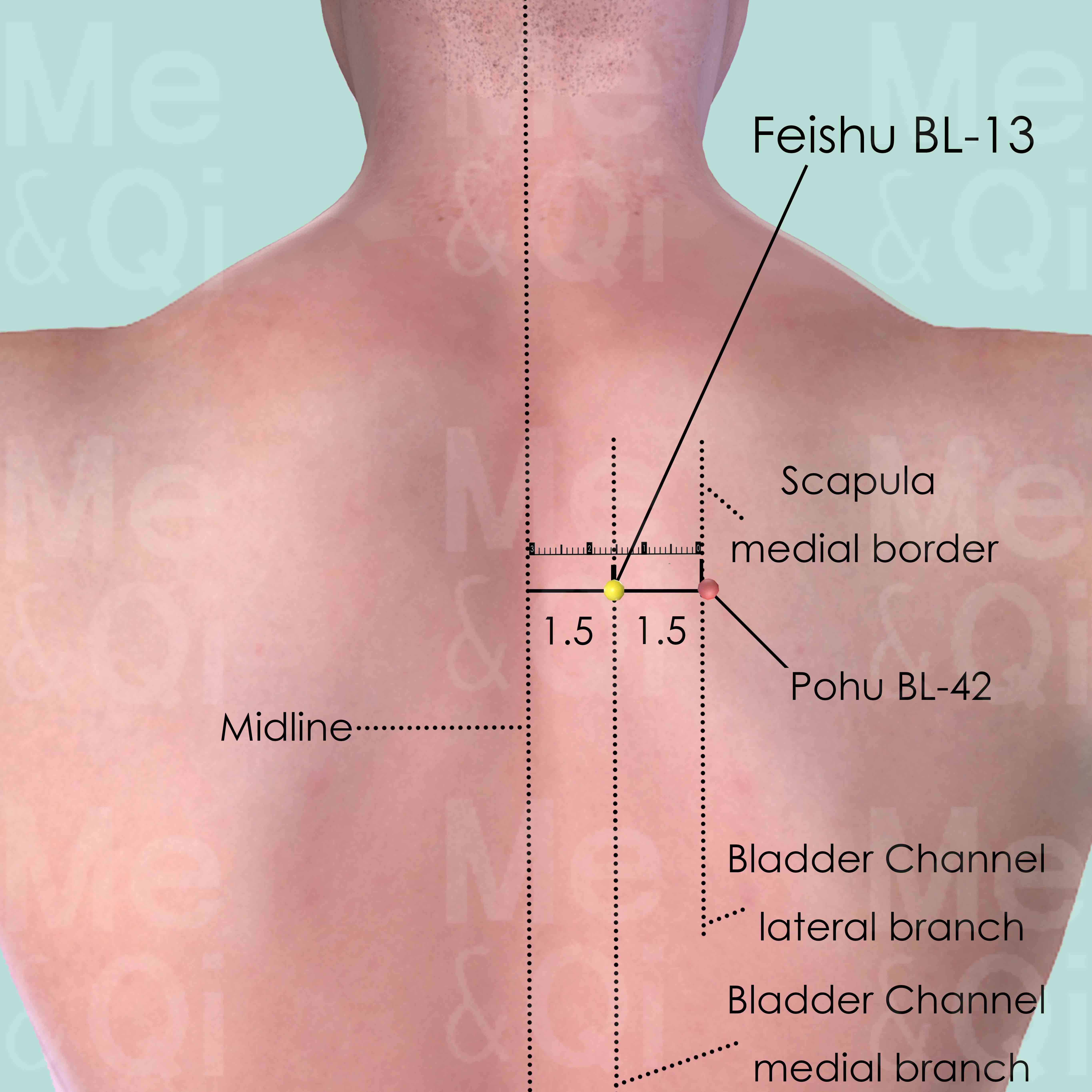
Feishu BL-13
1.5 cun lateral to the lower border of the spinous process of the 3rd thoracic vertebra (T3).
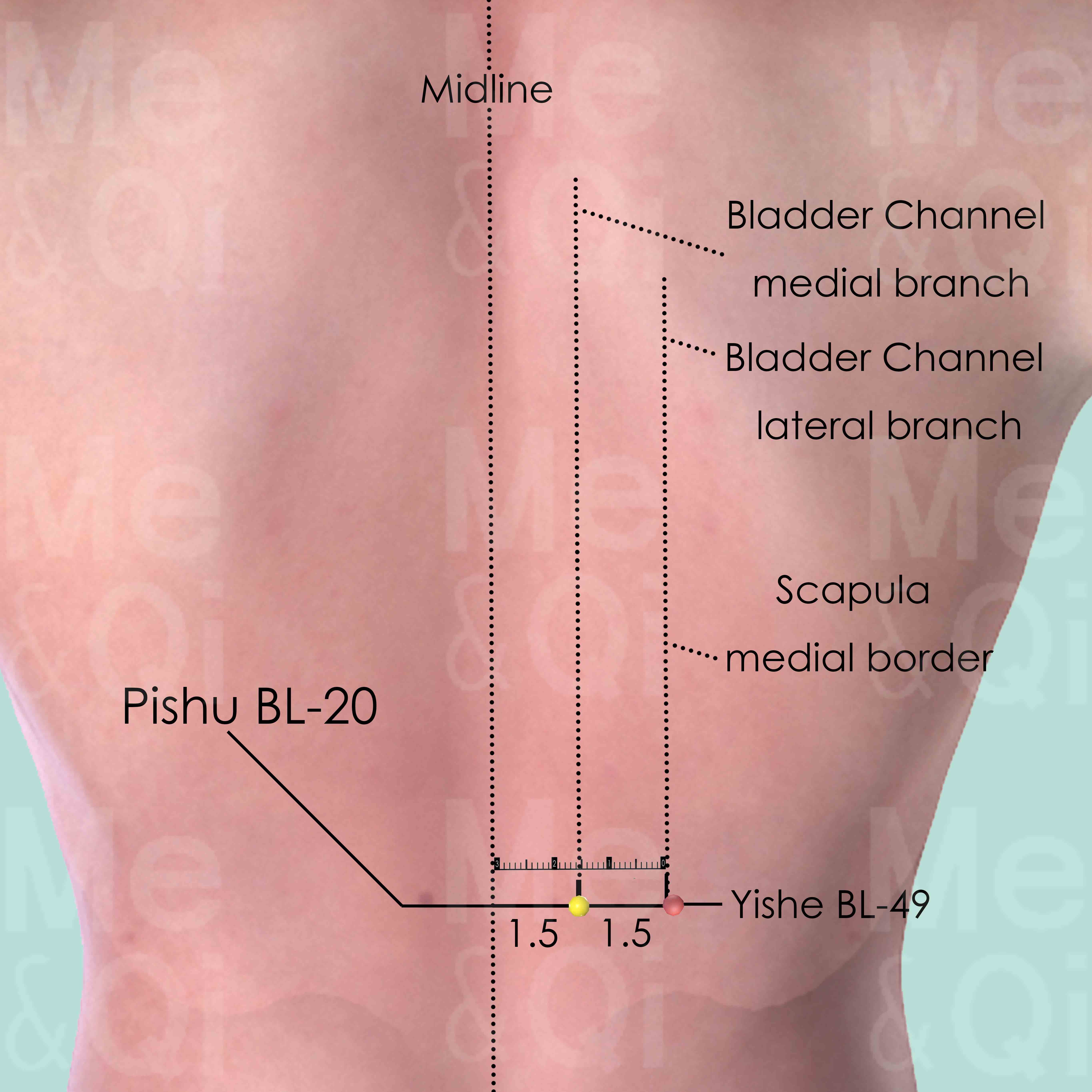
Pishu BL-20
1.5 cun lateral to the lower border of the spinous process of the 11th thoracic vertebra (T11).
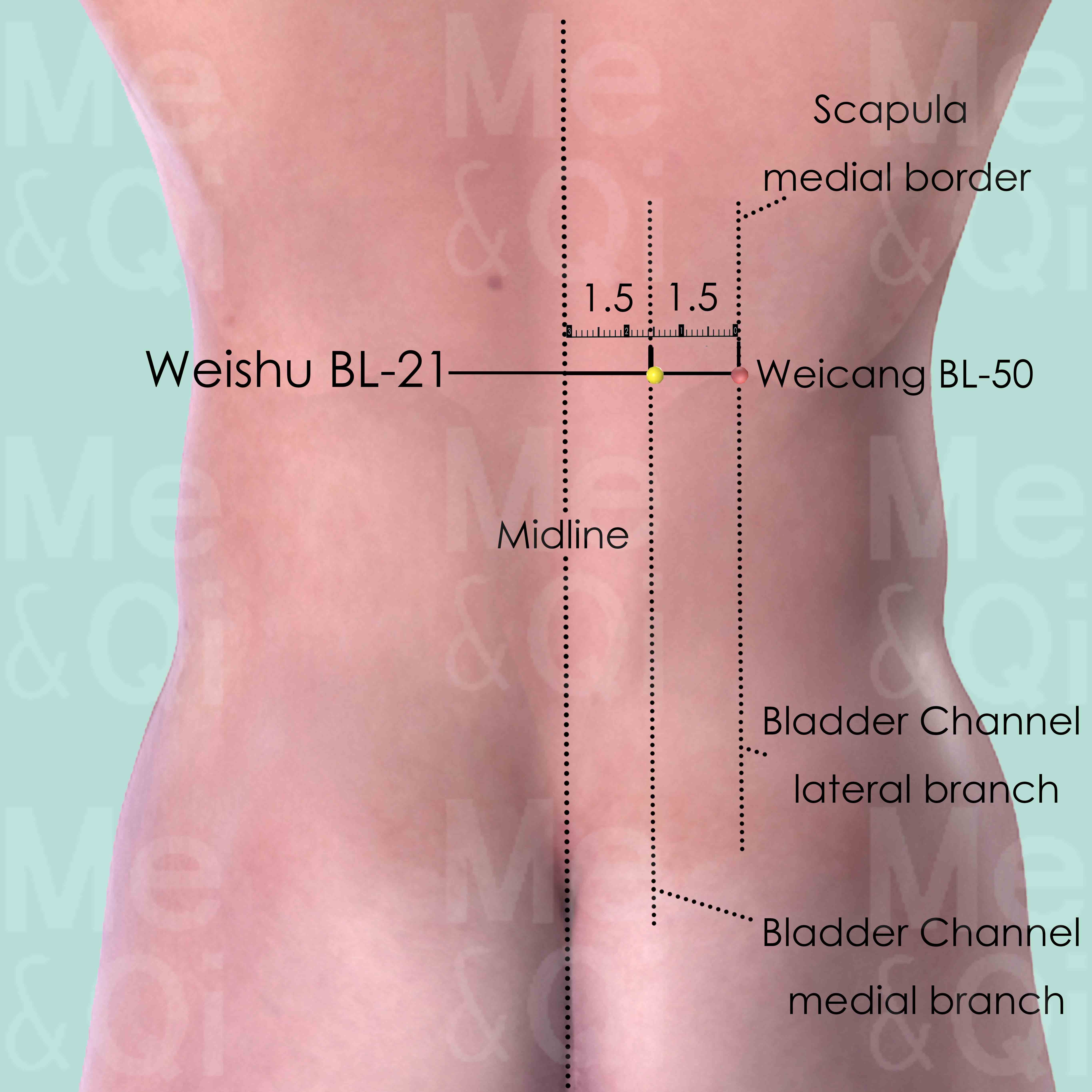
Weishu BL-21
1.5 cun lateral to the lower border of the spinous process of the 12th thoracic vertebra (T12).
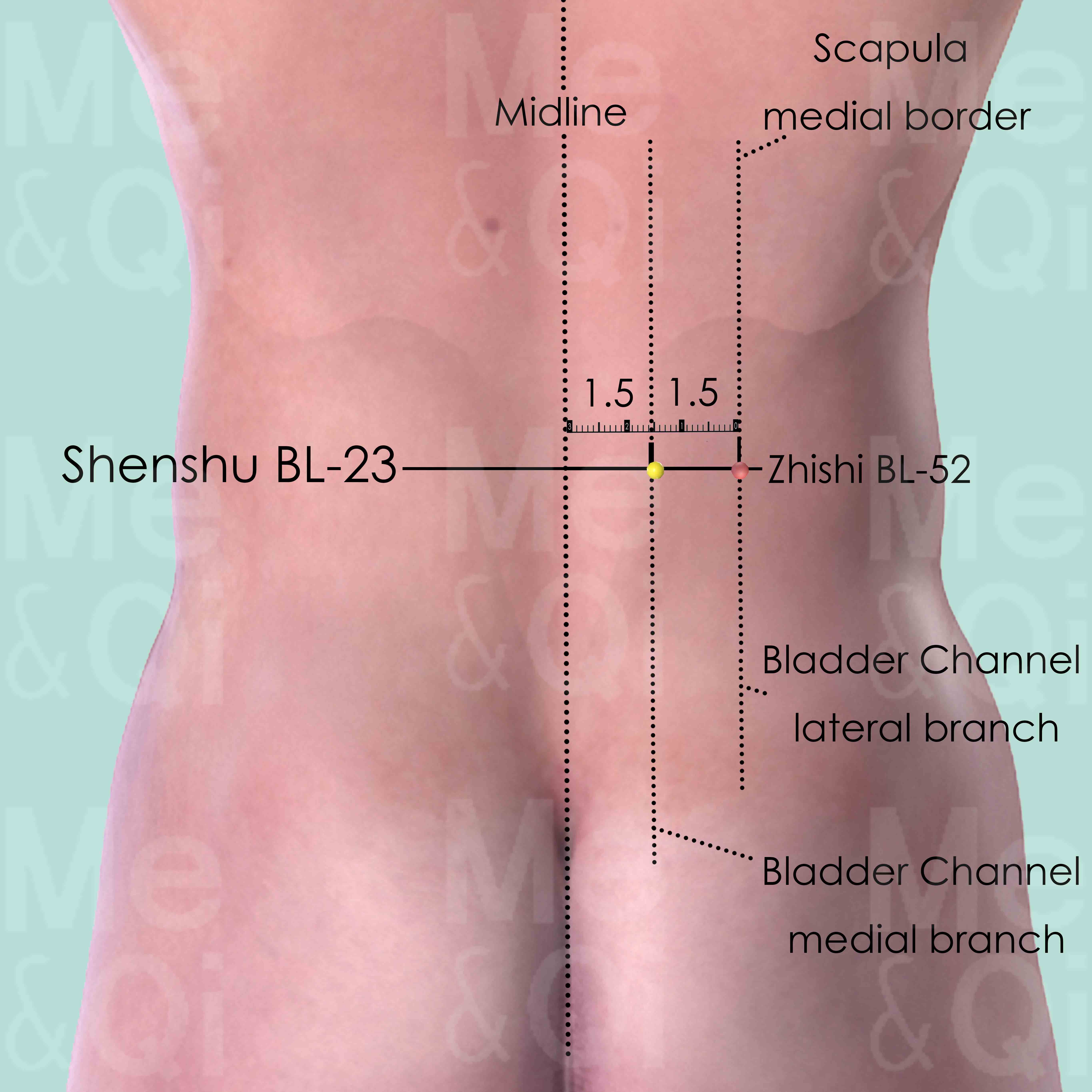
Shenshu BL-23
1.5 cun lateral to the lower border of the spinous process of the 2nd lumber vertebra (L2).
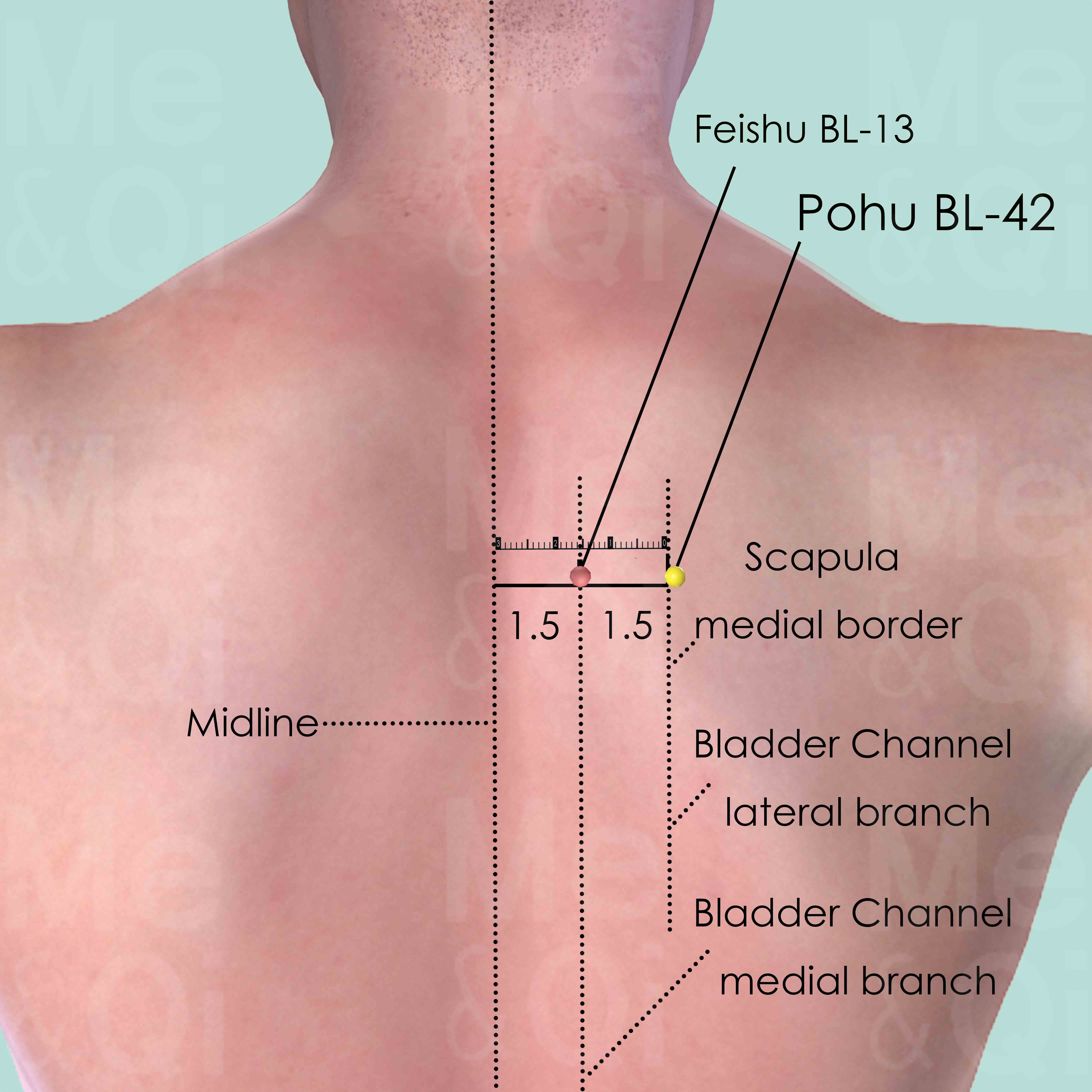
Pohu BL-42
3 cun (about 4 finger-breadths) lateral to the lower border of the spinous process of the 3rd thoracic vertebra (T3).
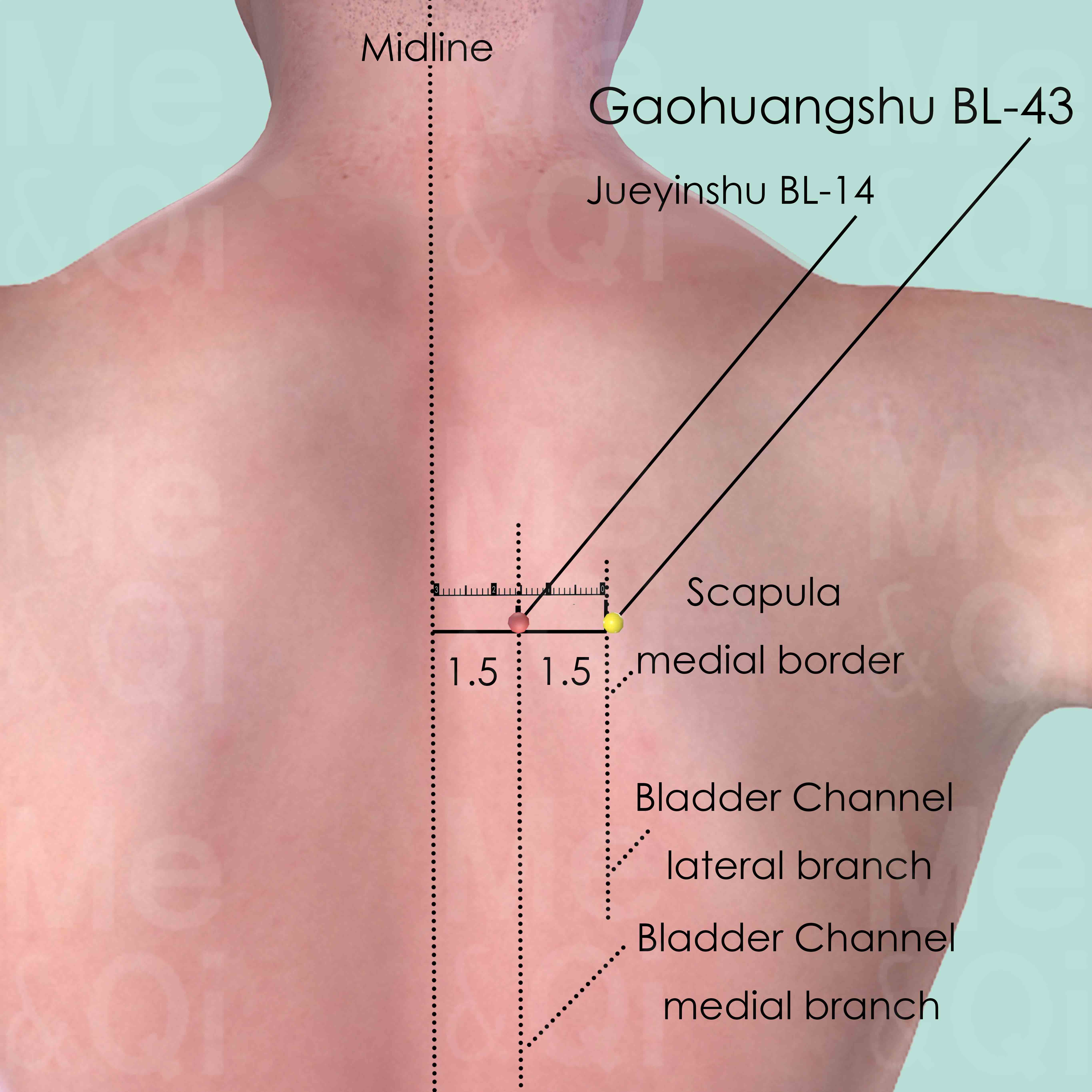
Gaohuangshu BL-43
3 cun (about 4 finger-breadths) lateral to the lower border of the spinous process of the 4th thoracic vertebra (T4).
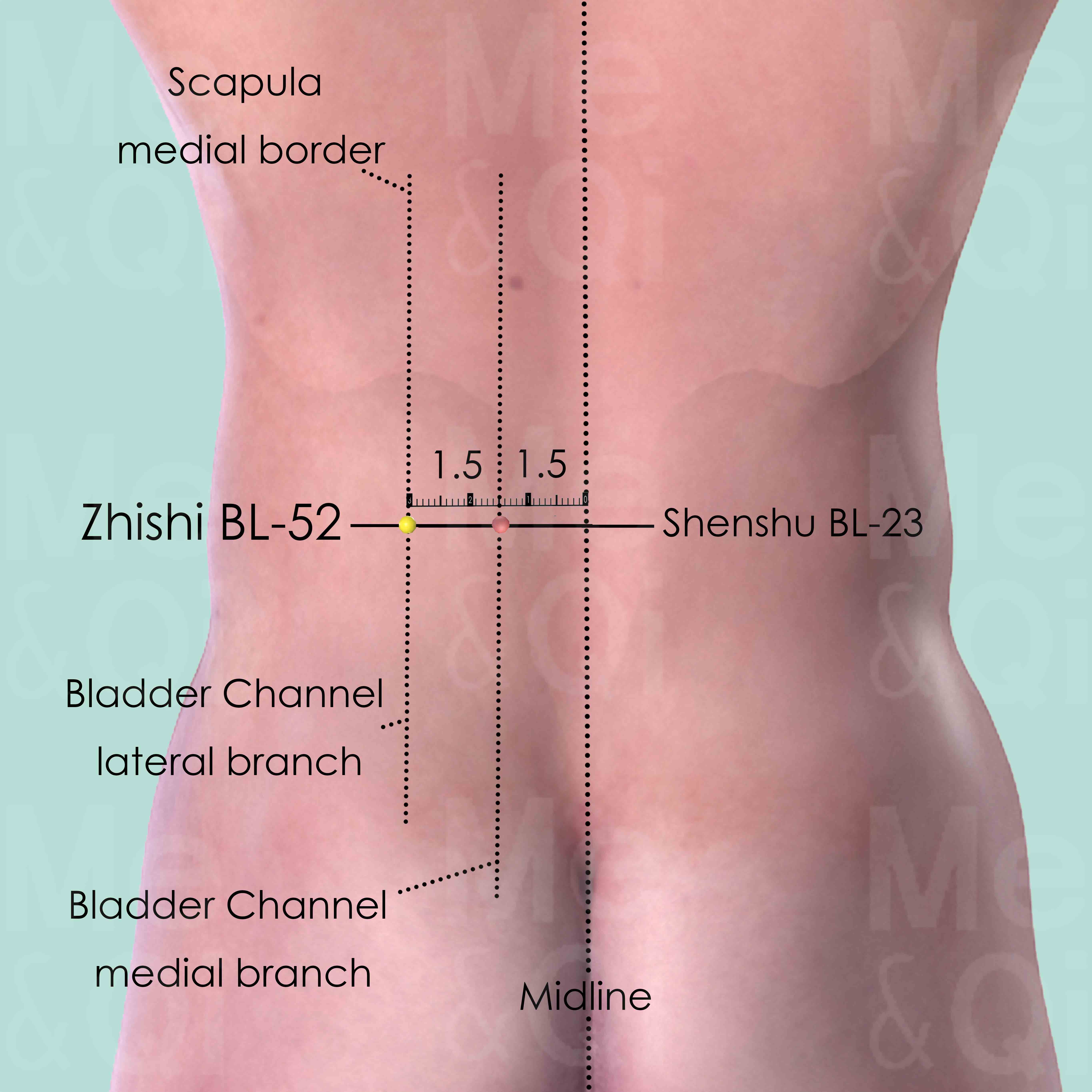
Zhishi BL-52
3 cun lateral to the lower border of the spinous process of the 2nd lumber vertebra (L2).
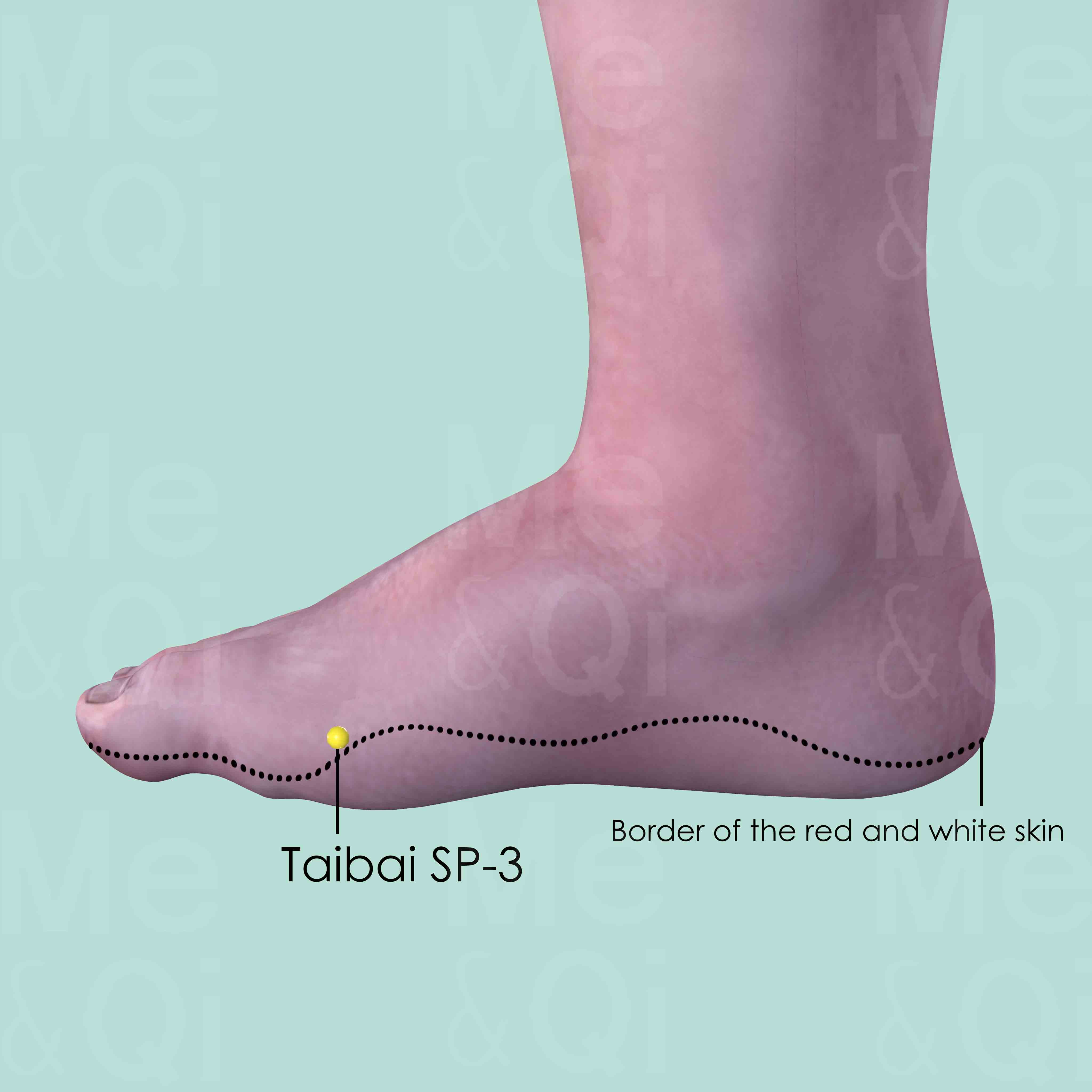
Taibai SP-3
Proximal and inferior to the head of the 1st metatarsal bone, at the border of the red and white skin.
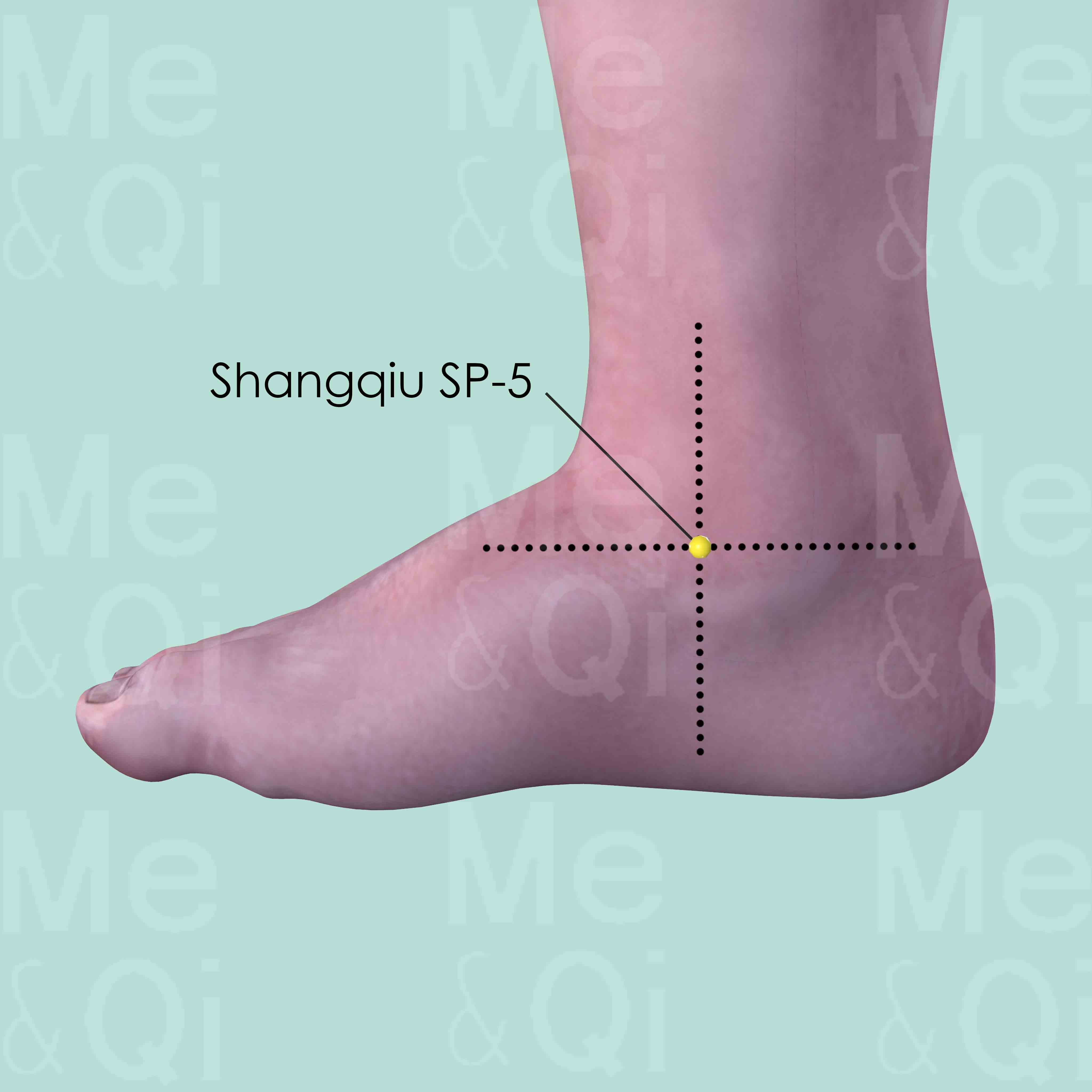
Shangqiu SP-5
In the depression distal and inferior to the medial malleolus, midway between the navicular bone tubercle and the tip of the medial malleolus.
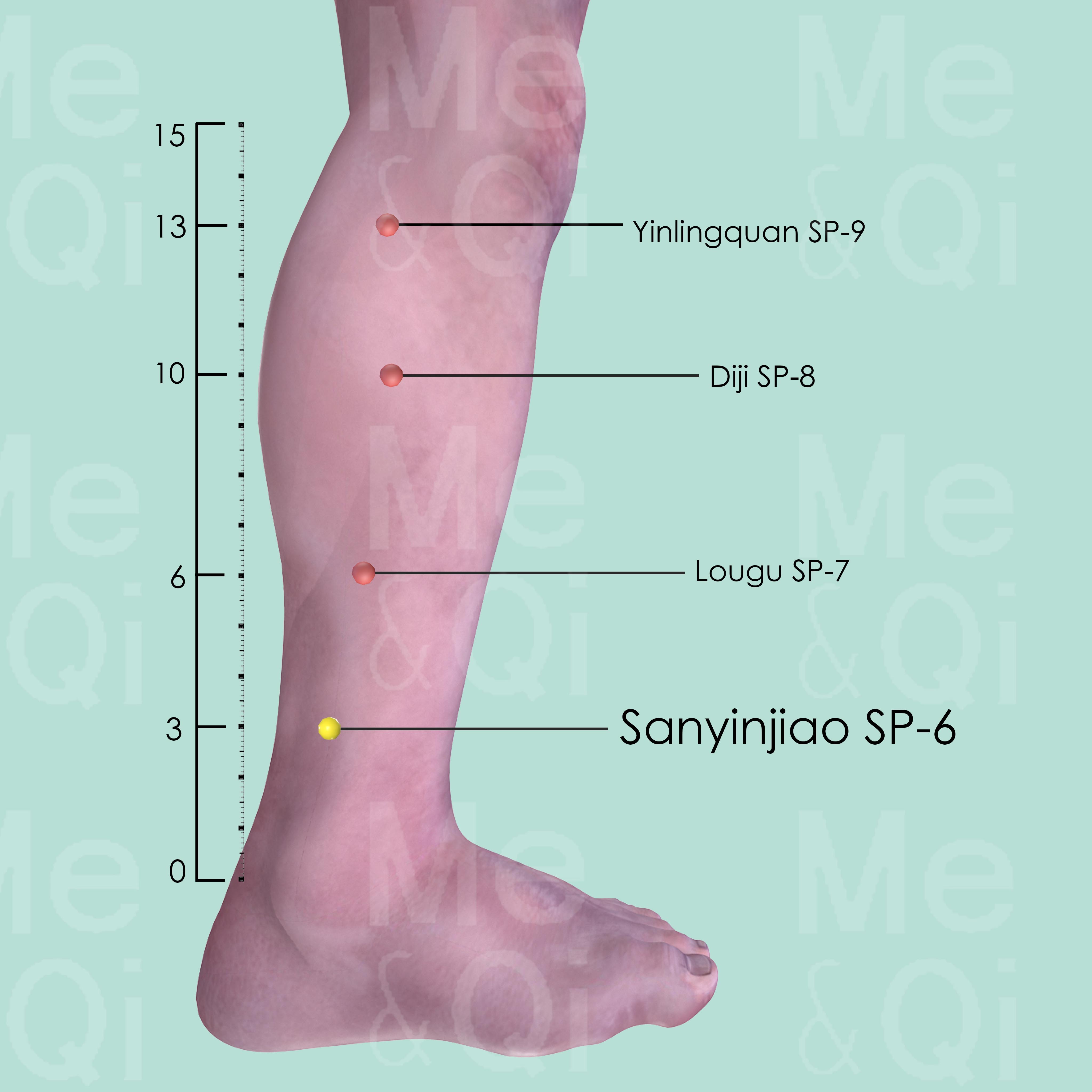
Sanyinjiao SP-6
3 cun directly above the tip of the medial malleolus, on the posterior border of the tibia, on the line drawn from the medial malleolus to Yinlingquan SP-9.
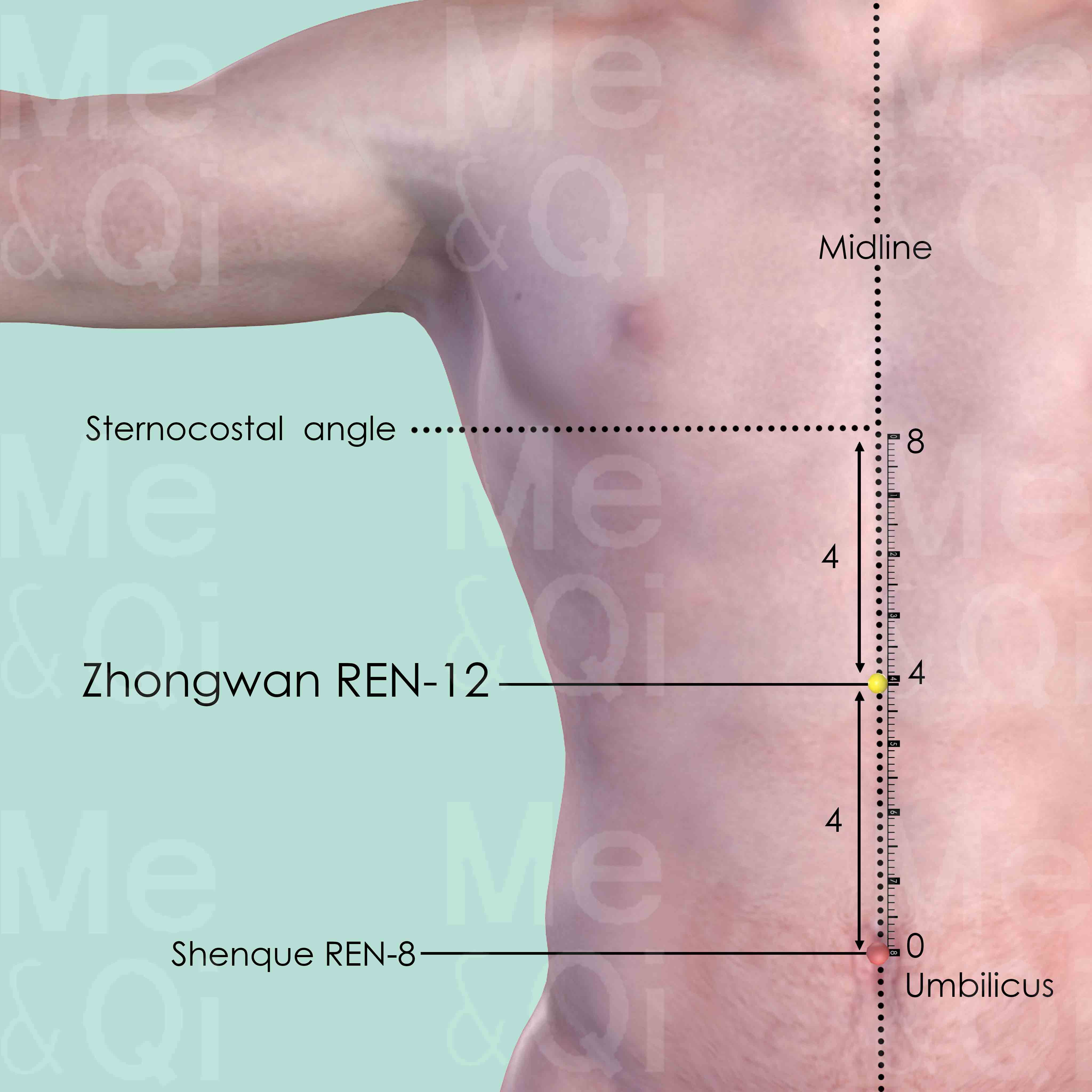
Zhongwan REN-12
On the midline of the abdomen, 4 cun above the umbilicus and 4 cun below the sternocostal angle.
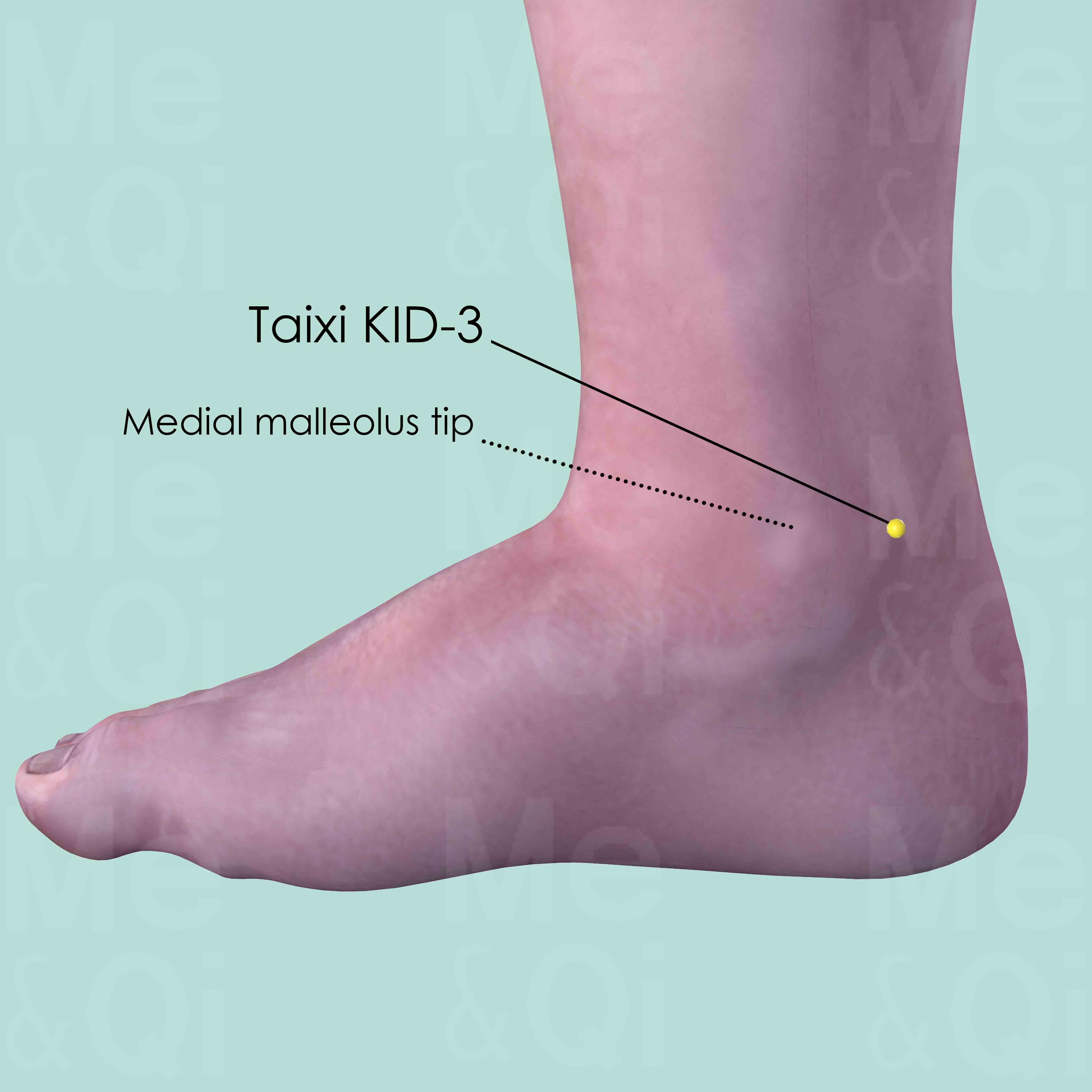
Taixi KID-3
In the depression between the medial malleolus tip and Achilles tendon (Calcaneal tendon), level with the tip of the medial malleolus.
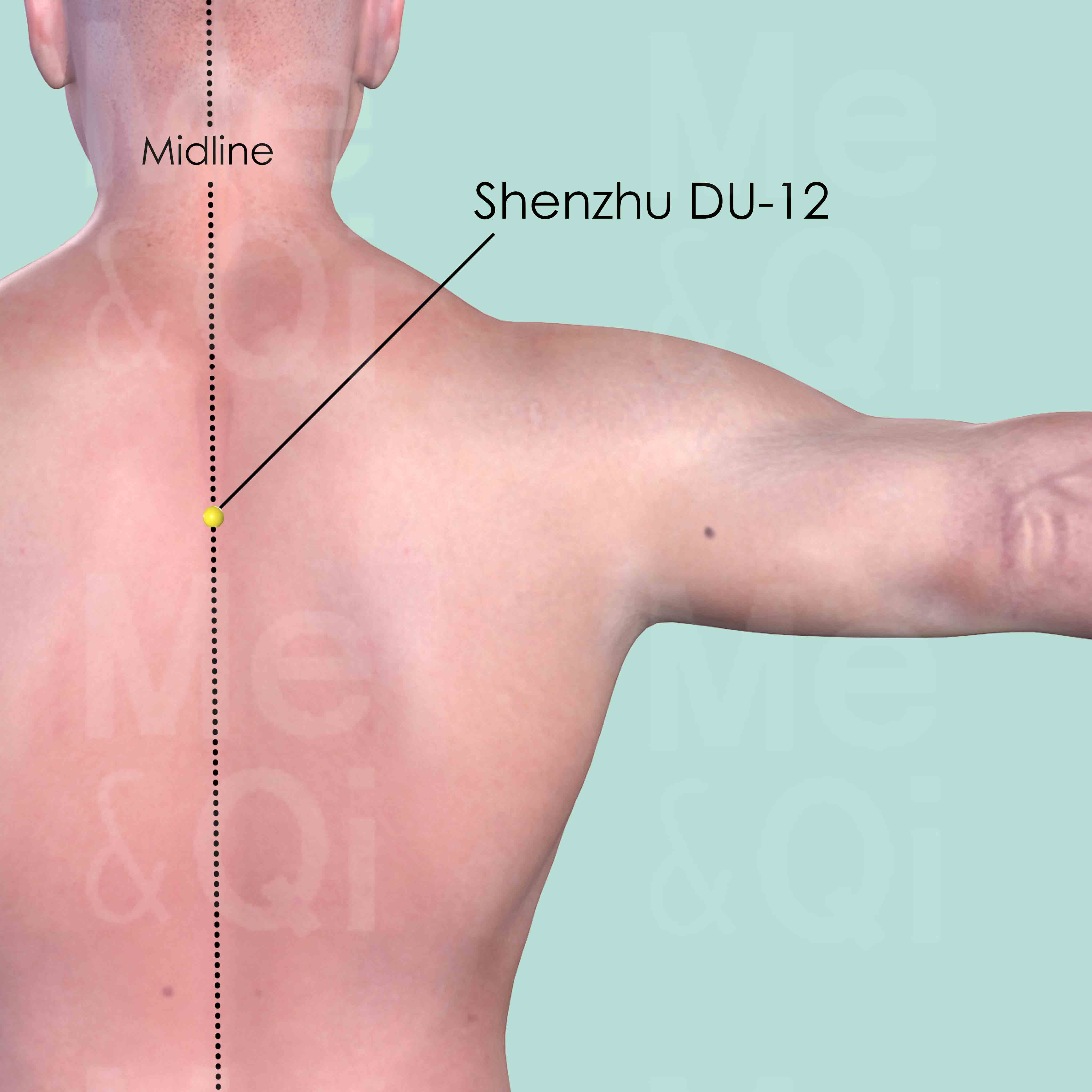
Shenzhu DU-12
On the back midline, in the depression below the spinous process of the 3th thoracic vertebra (T3).
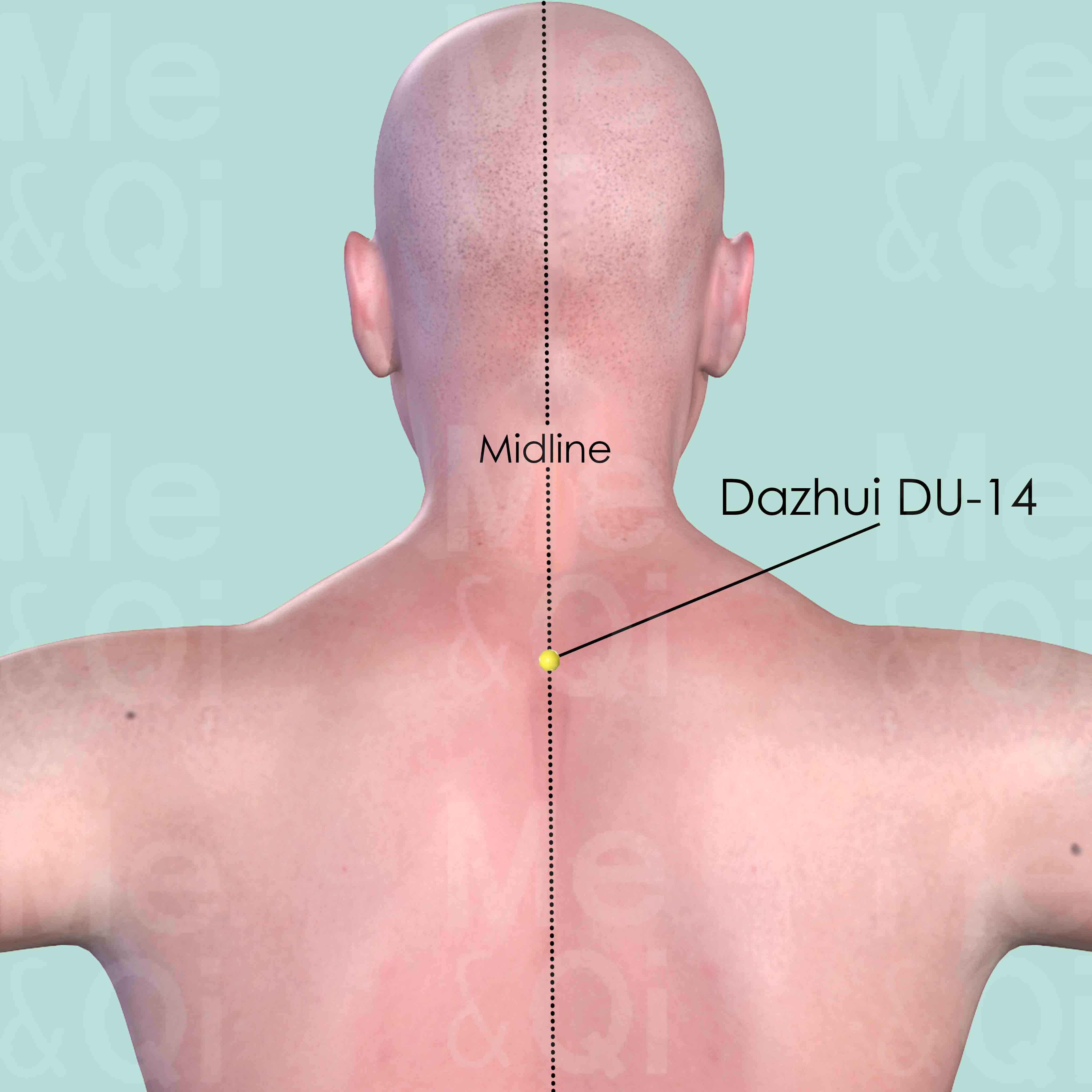
Dazhui DU-14
On the midline at the base of the neck, in the depression below the spinous process of the seventh cervical vertebra (C7).
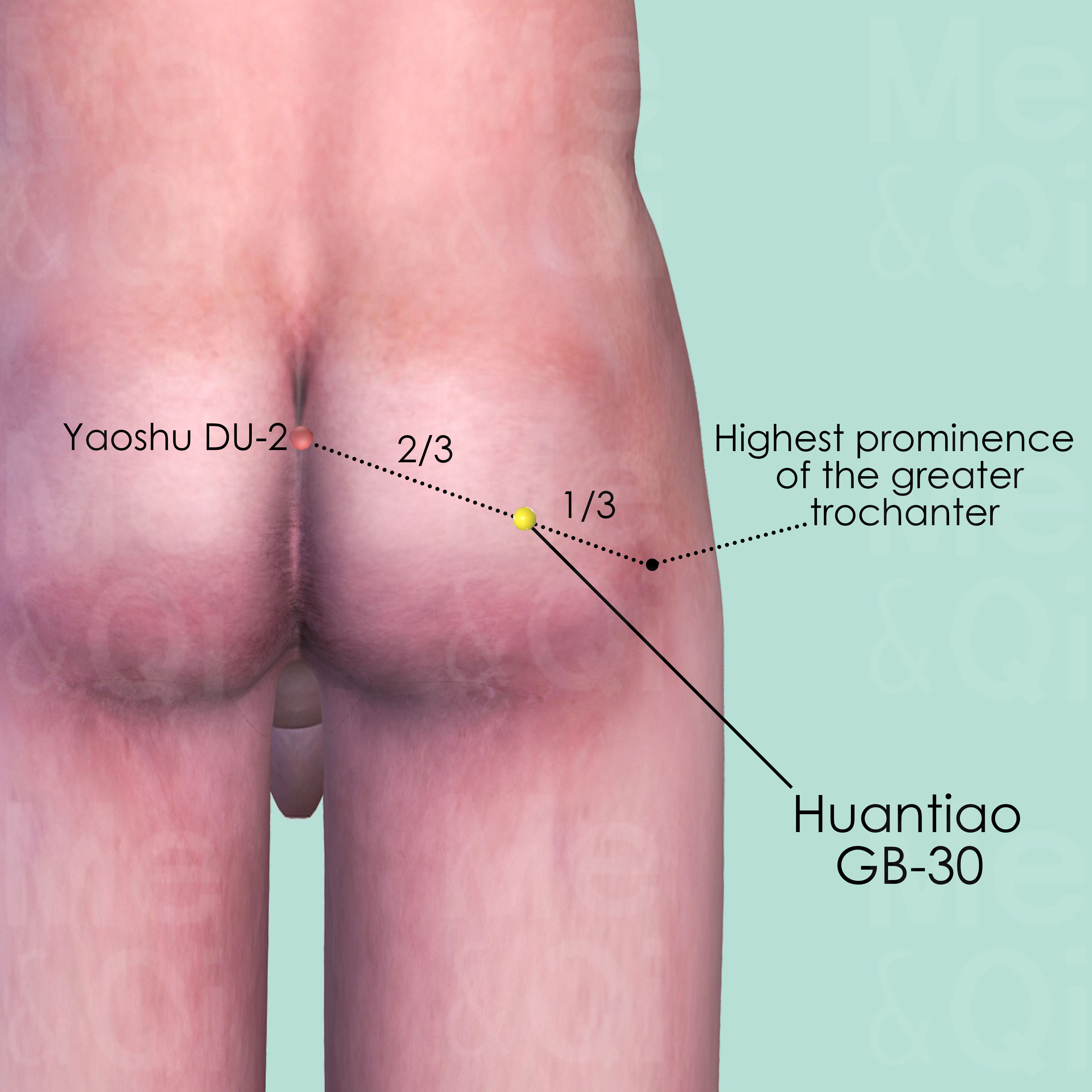
Huantiao GB-30
At the junction of the middle and lateral third of the distance between the great trochanter and Yaoshu DU-2 of the hiatus of the sacrum. When locating the point, put the patient in lateral recumbent position with the thigh flexed.
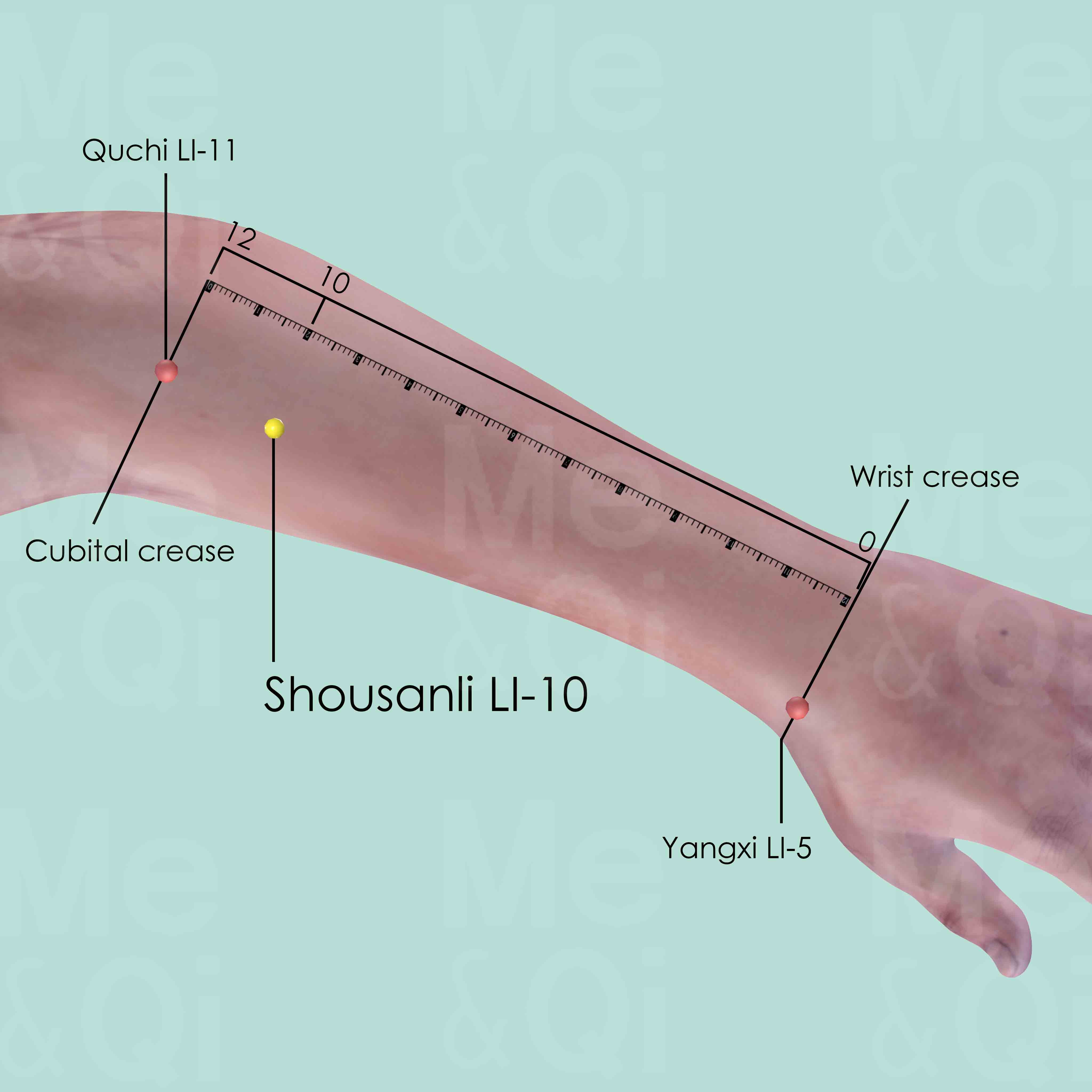
Shousanli LI-10
When a fist is made, with the ulnar side downward and elbow flexed, the point is 2 cun distal to Quchi LI-11 of the line joining Yangxi LI-5 and Quchi LI-11.
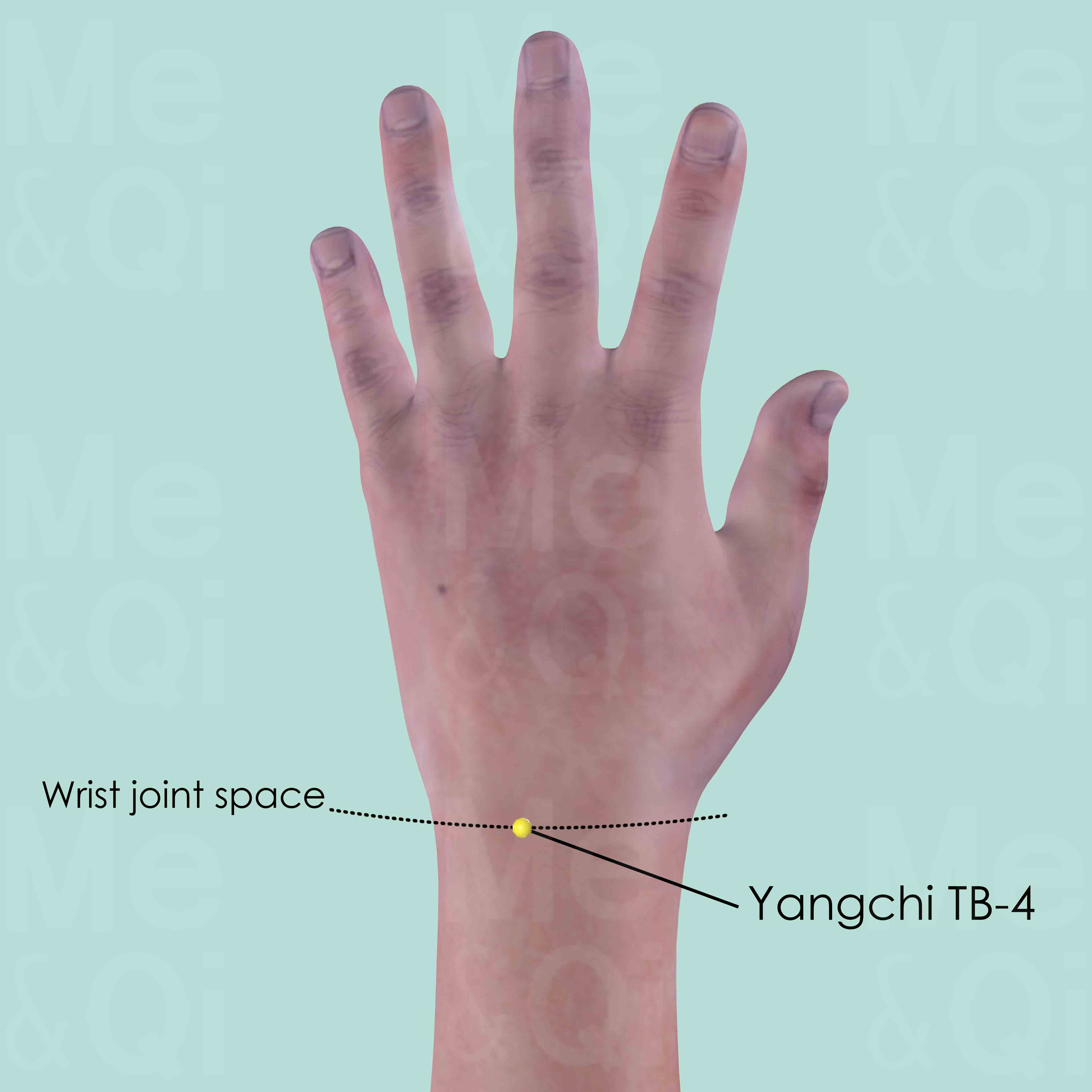
Yangchi TB-4
At the junction of the ulna carpal bones of the wrist dorsum, in the depression lateral to the tendon of extensor digitorum and extensor digiti minimi muscle.
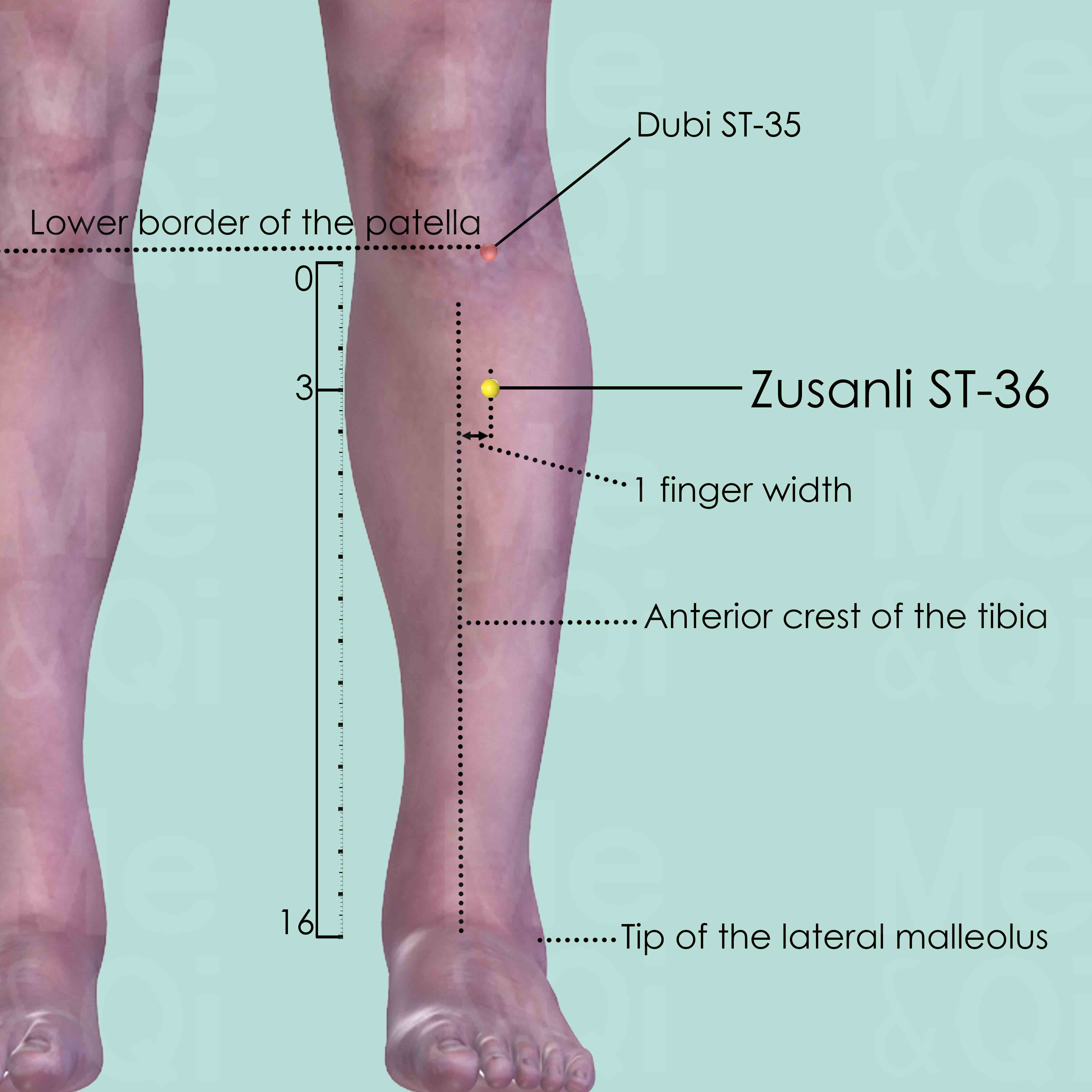
Zusanli ST-36
3 cun below Dubi ST-35, one finger breadth lateral to the anterior crest of the tibia, on the tibialis anterior muscle.

